Special Report
The Best and Worst States for LGBTQ People
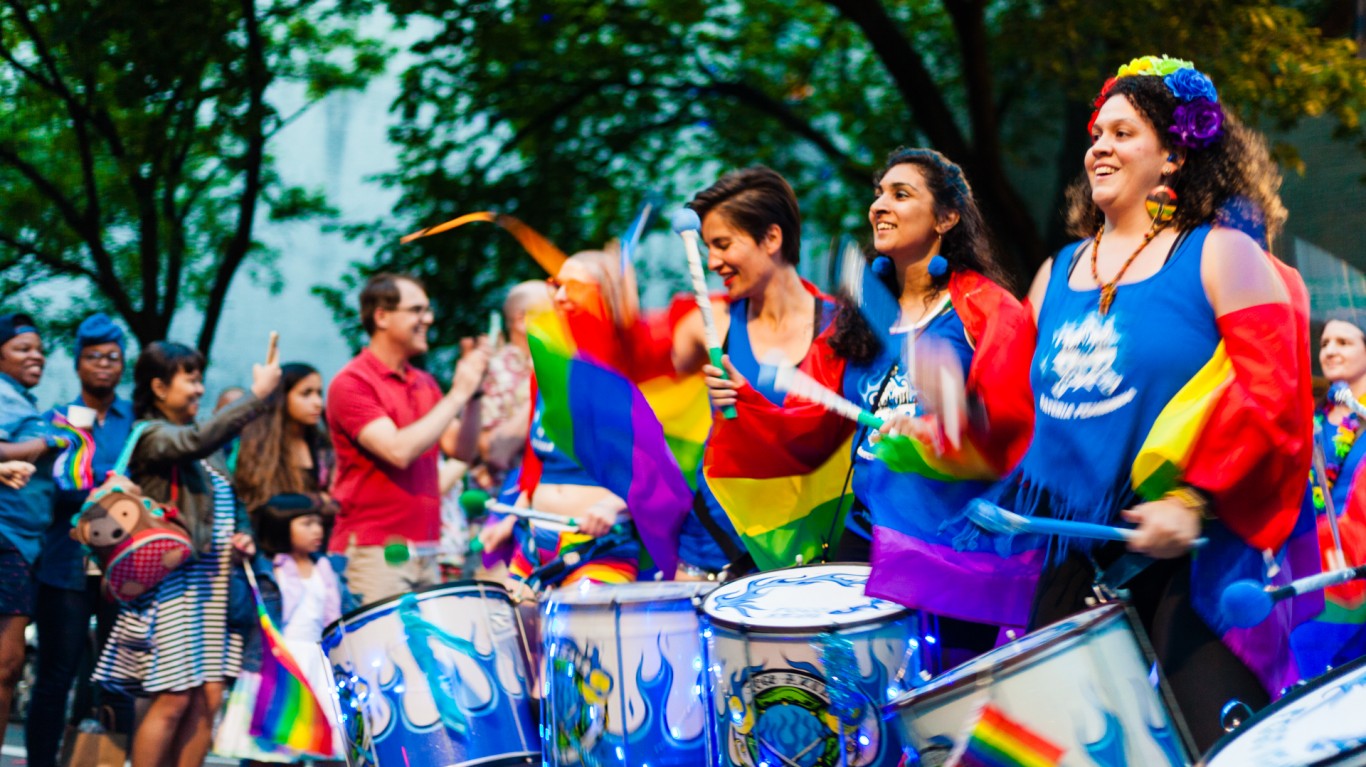
Published:

In a major civil rights decision, the U.S. Supreme Court ruled on June 15 that federal law protects workers from job discrimination based on their sexual orientation or expression. Until the ruling, 27 states did not have statewide laws banning such discrimination.
While this is progress for LGBTQ rights, the Trump administration on June 12 reversed an Obama era regulation protecting transgender people from discrimination when it comes to health care and health insurance. The new policy re-defines gender under the law as male or female, versus the Obama-era definition of gender as a person’s “internal sense of being male, female, neither or a combination.”
Across the United States, Americans have increasingly embraced equal treatment and access for lesbian, gay, bisexual, transgender, and queer (LGBTQ) Americans over the last decade. According to a Gallup poll in 2019, 63% of Americans supported same-sex marriage, compared with about 44% in 2010. Some cities are more welcoming to the LGBTQ community than their respective states — Austin, Texas, is one example — but, in general, entire states (rather than just cities within them) are moving toward protecting and empowering their LGBTQ residents.
In acknowledgement of Pride month, 24/7 Wall St. reviewed the states most and least welcoming to the LGBTQ community. We created an index of three measures — hate crimes motivated by gender and sexual orientation reported per 100,000 people, laws protecting the LGTBQ community, and the percentage of each state’s population who identifies as LGTBQ — to identify the best and worst states for LGBTQ people.
Some 396 pro-equality bills were introduced in states across the country in 2019, and 84 of them became law, according to the Human Rights Campaign’s 2019 State Equality Index. The annual report analyzes each state laws and policies affecting LGBTQ people, assessing how well states are doing to protect LGBTQ individuals from discrimination.
While there has been no doubt progress toward equality, anti-equality activists and politicians still have a lot of influence — in some states more than others. In Texas alone, 19 anti-LGBTQ bills were filed in 2019. In Iowa, transgender health care benefits were removed from the state’s medical plan. Across the country, 102 anti-LGBTQ bills were introduced, and seven became laws.
Even though the U.S. — and the world — is slowly becoming a more welcoming place for LGBTQ people, there are still many places where same-sex relationships are considered criminal behavior — these are the most difficult places in the world to be gay.
Click here to see the best and worst states for LGBTQ people
Click here to read our methodology
50. Alabama
> LGBTQ population: 3.1% — 5th lowest (total LGBTQ people: 117,000)
> CenterLink pride centers: 4 per 100,000 LGBTQ people — 6th highest (total: 5)
Based on its relatively small LGBTQ population and lack of progress passing laws that protect LGBTQ communities, Alabama is the worst state in the nation for LGBTQ Americans. Unlike the vast majority of states, which have mandatory hate crime reporting laws, Alabama police jurisdictions do not participate in reporting of hate crimes motivated by gender or sexual orientation.
In fact, the state has very few laws that positively affect LGTBQ residents, and plenty of rules that negatively affect LGBTQ communities. For example, in 2017, Gov. Kay Ivey signed legislation that would permit religious agencies to deny placing an adopted child in LGBTQ families. Alabama also restricts inclusion of LGBTQ topics in schools, and the state is one of 26 states that criminalize behaviors that carry low or negligible risk of HIV transmission (such as anti-sodomy laws). Such laws are considered archaic and frequently lead to abuse and discrimination against HIV-positive individuals and harms public health efforts.
[in-text-ad]
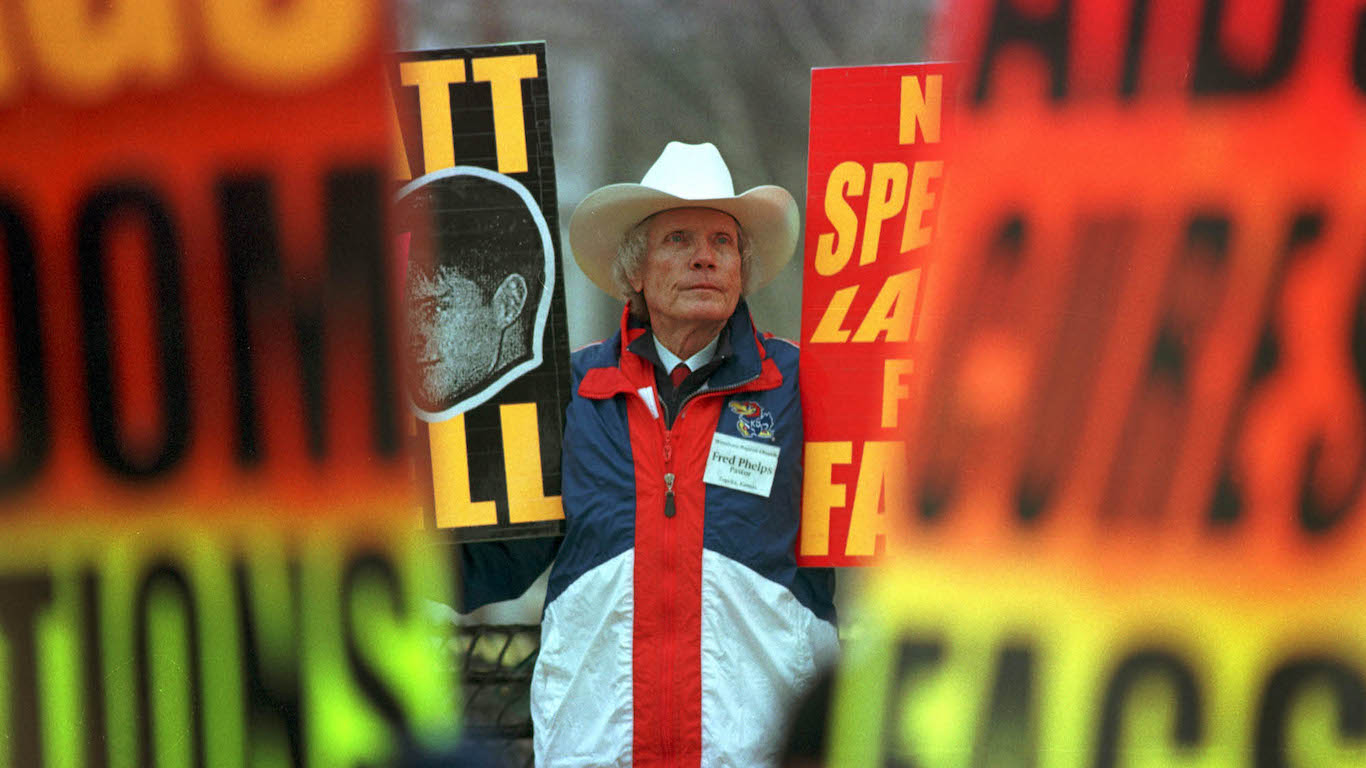
49. Wyoming
> LGBTQ population: 3.3% — 9th lowest (total LGBTQ people: 15,000)
> CenterLink pride centers: 7 per 100,000 LGBTQ people — 2nd highest (total: 1)
Just 3.3% of Wyoming’s population identifies as LGBTQ, the ninth lowest such share of any state. Relatively low numbers of LGBTQ state residents could reflect lower likelihood of identifying as LGBTQ and a generally less hospitable state for the community.
Wyoming is the state where Matthew Shepard, a gay college student, was beaten and left to die in the town of Laramie in 1998, in an incident that shocked the nation. There have been other incidents against gay people in recent years, and a gay man who was bullied committed suicide in 2016. Tragic incidents such as these are unfortunately common across the country, but considering the general inhospitable environment in the state, including lacking laws that would protect basic LGBTQ civil rights, these incidents take perhaps additional meaning in Wyoming. Still, there are people in Wyoming who continue to struggle for equal rights under the law. The cities of Casper and Cheyenne held their first pride marches in 2017. Also, about 22,000 people came out in support of University of Wyoming diver Scotia Mullin, an openly gay athlete, who received All-American recognition.
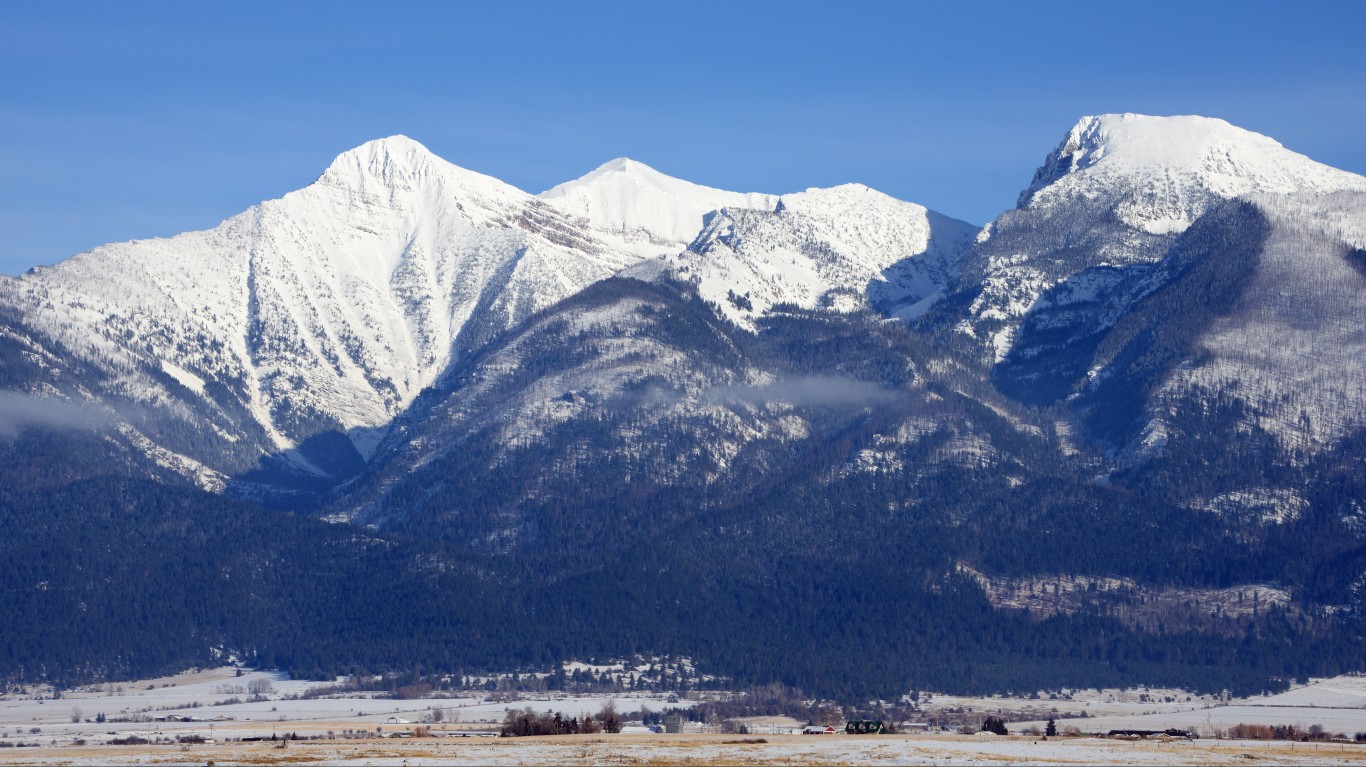
48. Montana
> LGBTQ population: 2.9% — 3rd lowest (total LGBTQ people: 24,000)
> CenterLink pride centers: 4 per 100,000 LGBTQ people — 8th highest (total: 1)
As is often the case, certain cities are safer for LGBTQ Americans than a state as a whole. The city of Missoula, where the University of Montana is located, is a progressive bastion in the Big Sky state. Bars and restaurants weclome the the LGBTQ community, which has gay chorus groups and running clubs. Missoula was the first Montana city to pass anti-discrimination laws to protect the LGBTQ community. Other Montana cities considered friendly to gay people are Bozeman and the state capital of Helena.
LGBTQ people still face challenges such as laws that limit them from adopting children. There are no nondiscrimination protections based on gender identity for employment, housing, public accomodations, education, adoption, foster care, insurance, credit, or in jury selection in Montana.

47. North Dakota
> LGBTQ population: 2.7% — the lowest (total LGBTQ people: 16,000)
> CenterLink pride centers: N/A
North Dakota is one of 26 states with laws that criminalize behaviors that carry low or negligible risk of HIV transmission (such as anti-sodomy laws). Such laws are considered archaic and frequently lead to abuse and discrimination against HIV-positive individuals and harms public health efforts.
North Dakota has the smallest population of people who identify as LGBTQ, making up just 2.7% of state residents. As is often the case even in the worst states for LGTBQ Americans, some cities in the state appear to be exceptions to the state as a whole. Fargo and Grand Forks are two of the most LGBTQ-friendly cities in the state. Fargo was the first city in the High Plains state to pass anti-discrimination legislation that shielded gay people, and it also holds the distinction of hosting the longest-running Pride festival in the state. Fargo also hosts an LGBTQ film festival.
[in-text-ad-2]
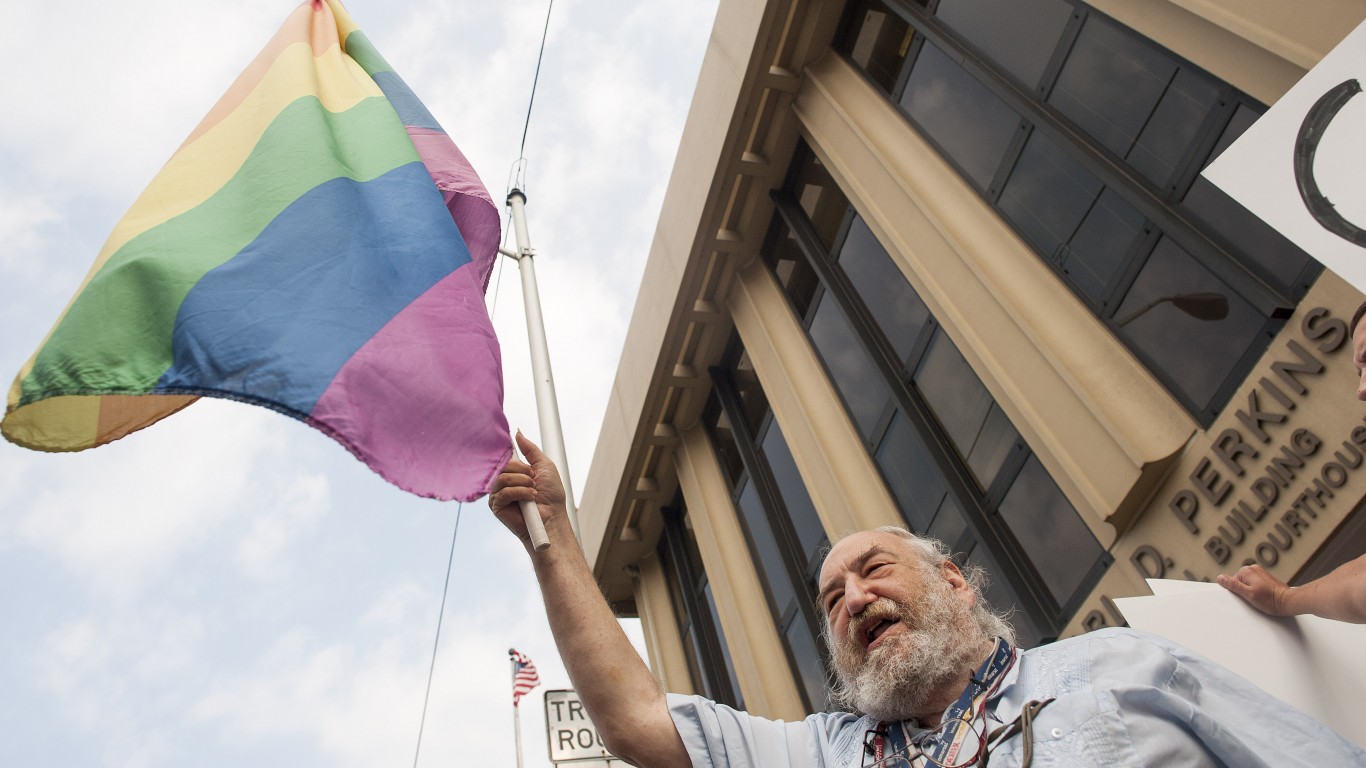
46. Kentucky
> LGBTQ population: 3.4% — 10th lowest (total LGBTQ people: 117,000)
> CenterLink pride centers: 3 per 100,000 LGBTQ people — 18th highest (total: 3)
Kentucky is one of 26 states with laws that criminalize behaviors that carry a low or negligible risk of HIV transmission. Kentucky is also one of many states to pass the State Religious Freedom Restoration Act, which allows business owners to opt out of providing service to same-sex couples on religious grounds.
The city of Morehead made headlines in 2015 when city clerk Kim Davis refused to issue marriage licences for gay couples, flouting the Supreme Court ruling that legalized same-sex marriage. That sparked a demonstration by residents in the town, which had passed a nondiscriminatory ordinance several years earlier. Other cities in Kentucky considered tolerant of LGBTQ people are Louisville and Lexington, both of which passed ordinances protecting their civil rights. The state passed The Kentucky Religious Freedom Act in 2013 that some gay groups feared would nullify ordinances enacted to protect their civi liberties.
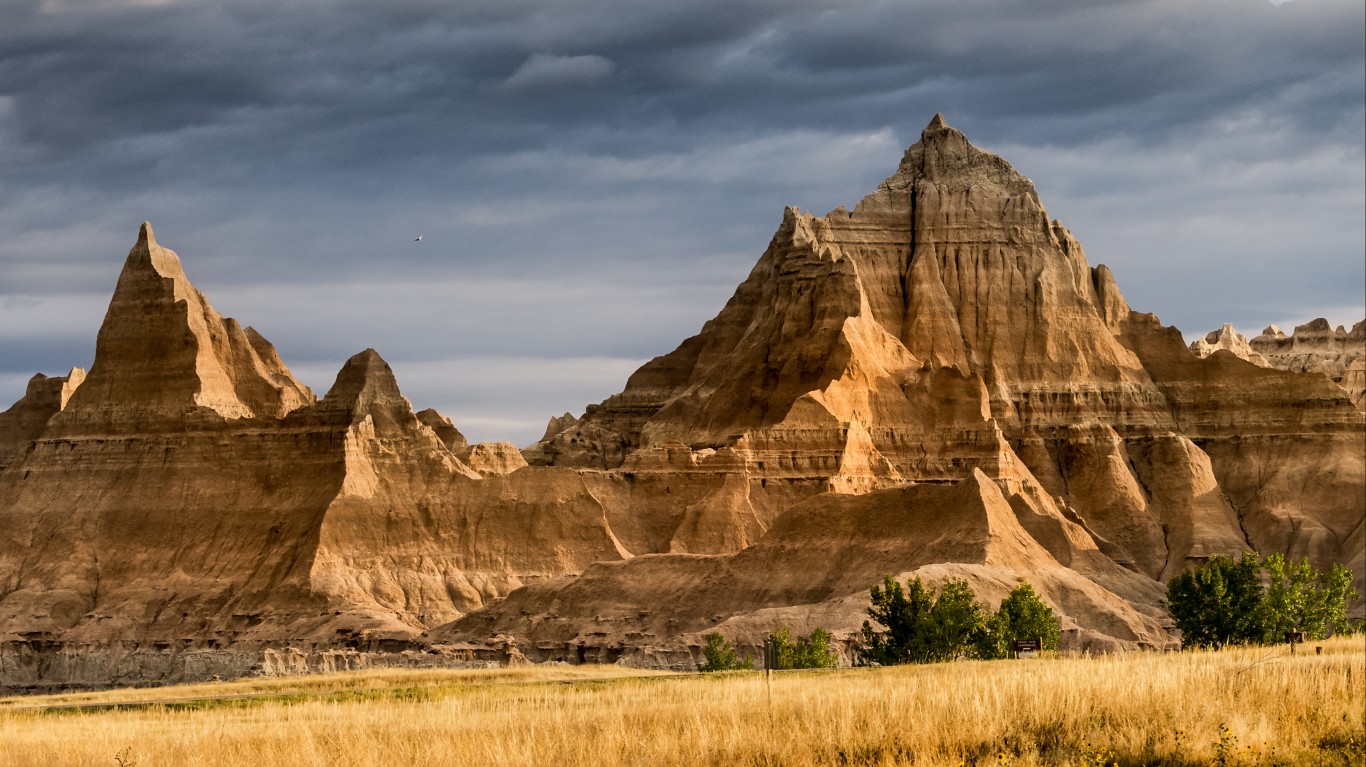
45. South Dakota
> LGBTQ population: 3.0% — 4th lowest (total LGBTQ people: 20,000)
> CenterLink pride centers: 5 per 100,000 LGBTQ people — 4th highest (total: 1)
The political climate in South Dakota has not been friendly toward LGBTQ people, where laws limit them from adopting children and where laws criminalize behaviors that carry a low or negligible risk of HIV transmission. The state approved anti-LGBTQ legislation in 2019 that bars public school and kindergarten teachers of up to seventh grade to teach students about what it’s like to be transgender. The pro-LGBTQ community managed to convince legislators to reject another bill that would have prevented doctors from providing puberty blockers and gender confirmation procedures.
[in-text-ad]
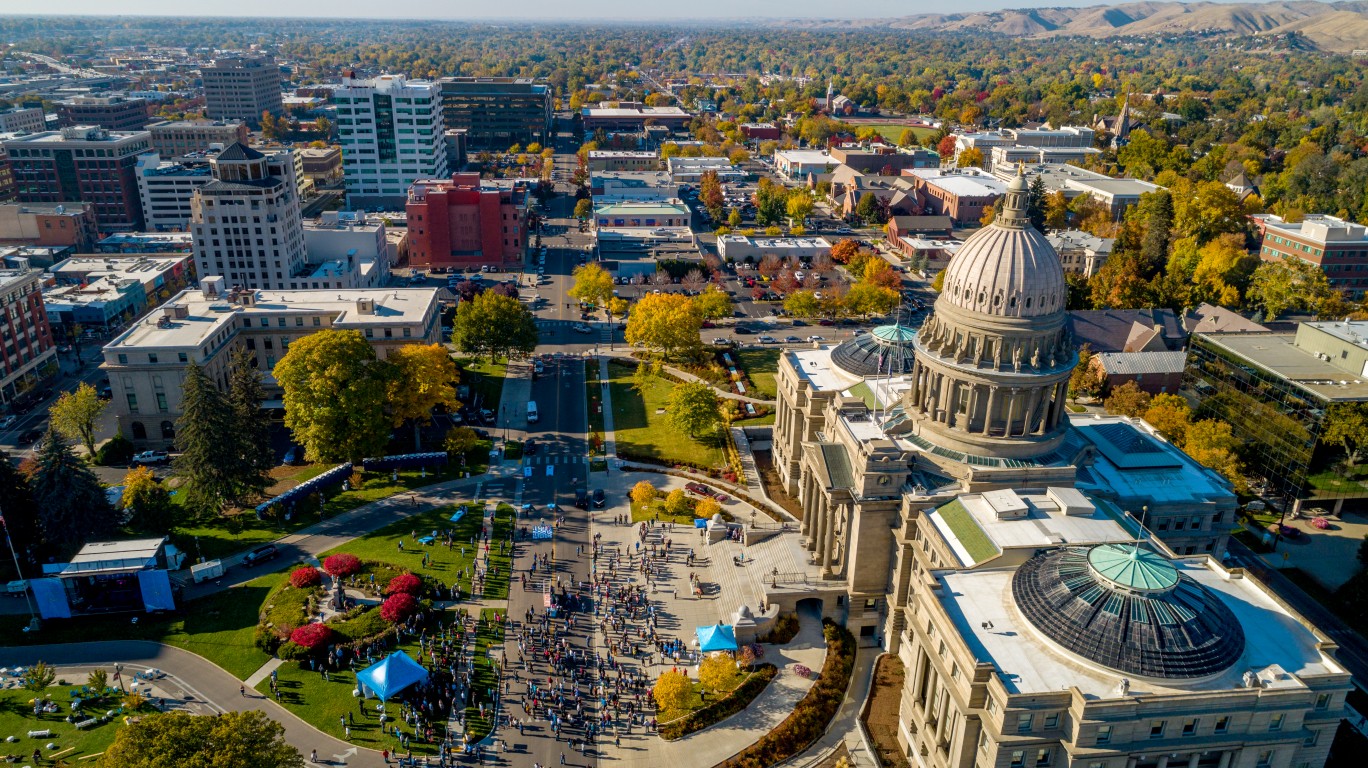
44. Idaho
> LGBTQ population: 2.8% — 2nd lowest (total LGBTQ people: 36,000)
> CenterLink pride centers: 3 per 100,000 LGBTQ people — 13th highest (total: 1)
There are 11 cities in Idaho that have nondiscrimination ordinances protecting LGBTQ residents from losing employment, housing, or public accomodations on the basis of their sexual orientation and gender identity. However, no such statewide laws have been passed. In fact, none of Idaho’s nondiscrimination laws include sexual orientation and gender identity.
In addition, Idaho is one of nine states to specifically prohibit Medicaid coverage for transition-related care for transgender people, and one of 26 states to criminalize behaviors that carry low or negligible risk of HIV transmission (such as anti-sodomy laws). Such laws are considered archaic and frequently lead to abuse and discrimination against HIV-positive individuals and harms public health efforts.
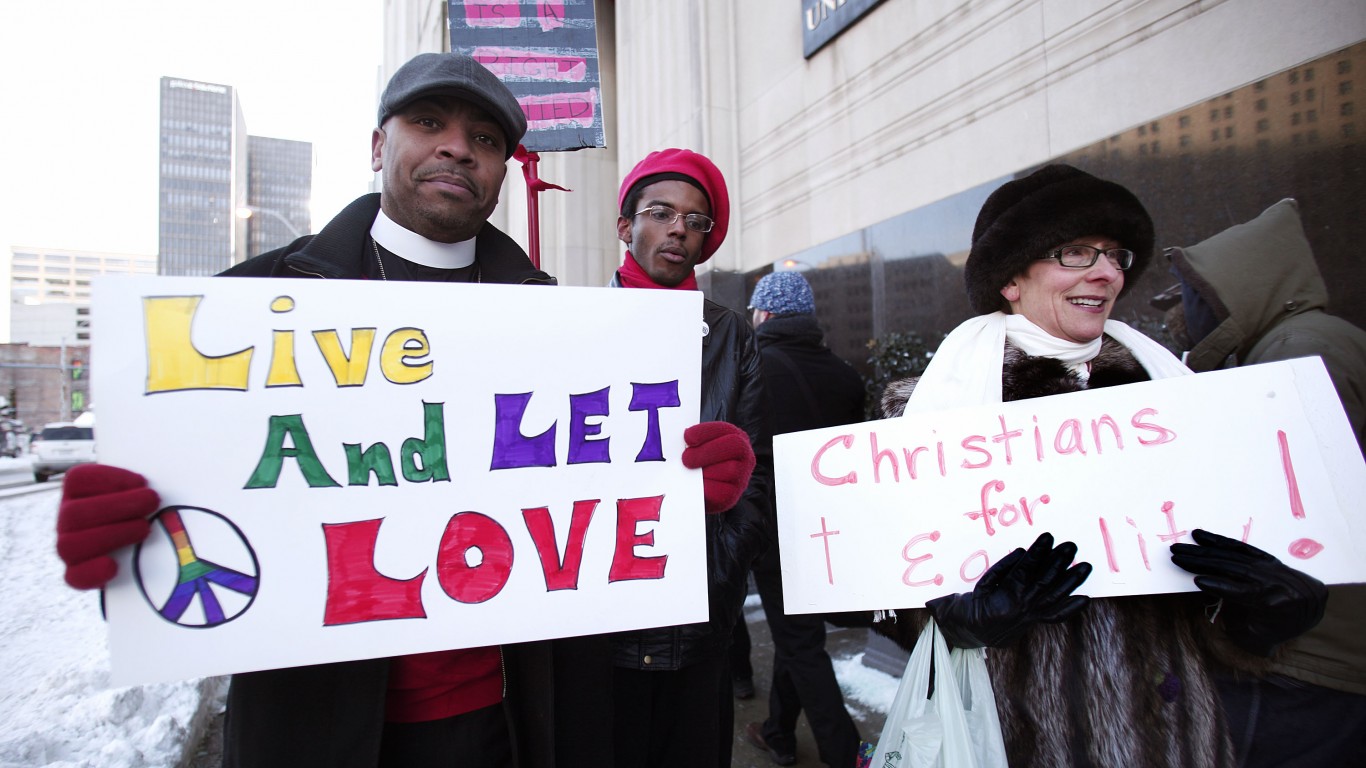
43. Michigan
> LGBTQ population: 4.0% — 25th lowest (total LGBTQ people: 311,000)
> CenterLink pride centers: 4 per 100,000 LGBTQ people — 7th highest (total: 13)
Likely due in part to a state law requiring the reporting of hate crimes motivated by sexual orientation, Michigan has one of the highest levels of such hate crimes reported per 100,000 residents. Other laws are less positive for LGTBQ Michigan residents. While the state does not have laws or policies banning LGBTQ people from becoming foster parents, Michigan does have a law permitting discrimination in adoption procedues and foster placement. A bill that would ban the widely-scorned practice of conversion therapy was introduced in April 2019. As of December 2019, however, the bill had not even received a hearing.
Two cities in Michigan stand out as exceptions to the general unfriendly environment for LGTBQ communities. Saugatuck and Douglas, two small beach towns, are popular destinations for gay and lesbian travelers, and frequently lauded as some of the most gay-friendly small towns in the country.
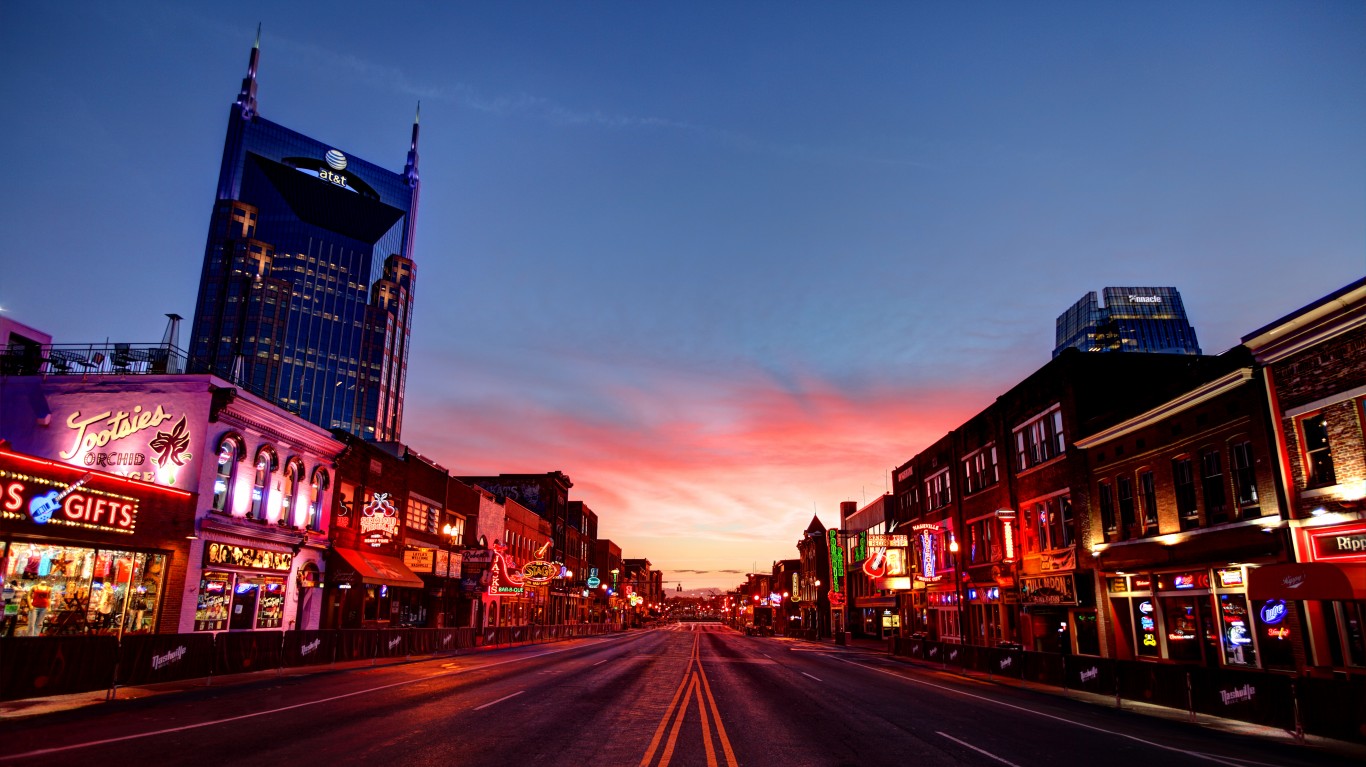
42. Tennessee
> LGBTQ population: 3.5% — 12th lowest (total LGBTQ people: 182,000)
> CenterLink pride centers: 1 per 100,000 LGBTQ people — 7th lowest (total: 2)
Transgender people in Tennessee cannot legally change their gender on ID cards. In 2019, the state considered a bill that would prohibit the adoption or enforcement of local measures that create protections for LGBTQ people. Tennessee passed a bill that can put transgender and non-binary people at increased risk of harassment for using restrooms and locker rooms consistent with their gender identity.
A law allowing discrimination in child welfare services was recently passed. According to the bill, adoption care and foster care agencies that receive funding from the state are allowed to operate under their own religious or moral beliefs, possibly discriminating against potential LGBTQ adoptive or foster parents.
[in-text-ad-2]
41. Kansas
> LGBTQ population: 3.3% — 9th lowest (total LGBTQ people: 73,000)
> CenterLink pride centers: 1 per 100,000 LGBTQ people — 13th lowest (total: 1)
Kansas has a law that creates different standards for the age of consent in same-sex and different-sex couples. A “Romeo and Juliet” exception, which prevents violation of age of consent laws if the couple is close in age, does not apply for same-sex couples in Kansas. Laws adversely affecting LGTBQ communities continue to be proposed by state representatives. Lawmakers introduced a bill in 2019 calling same-sex marriages “parody marriages.” The bill, which LGBTQ advocacy group Equality Kansas called the “most vile” bill in Kansas’ history, did not pass.
As a state, Kansas lacks the nondiscrimination ordinances that many other states in the country have, though some cities have their own. In October 2019, Overland Park, which is the second largest city in the state after Wichita, banned discrimination based on sexual orientation or gender identity.
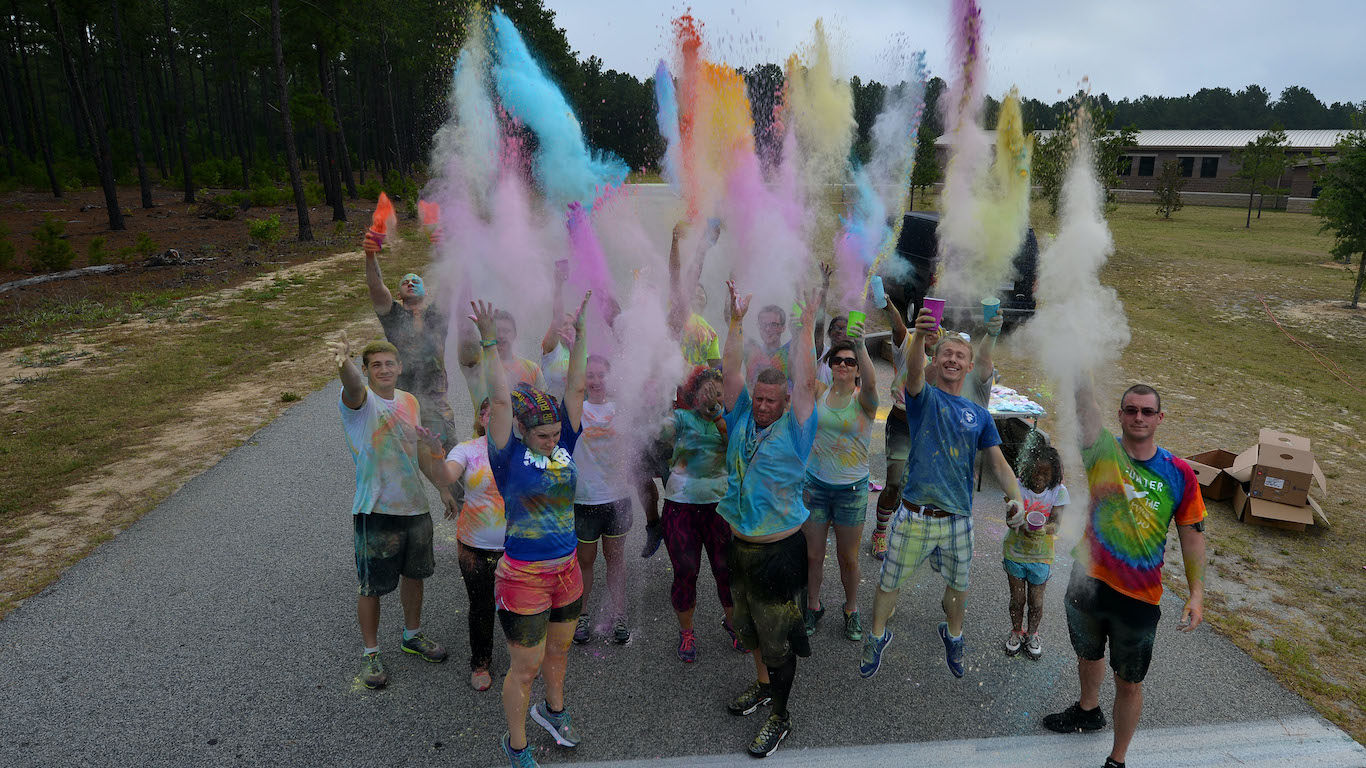
40. South Carolina
> LGBTQ population: 3.3% — 9th lowest (total LGBTQ people: 137,000)
> CenterLink pride centers: 3 per 100,000 LGBTQ people — 12th highest (total: 4)
South Carolina elected its first openly gay state lawmaker in 2017 — an attorney from Greenville and a Republican, but his election has not triggered, as some might have hoped for, a wave of bills protecting LGBTQ people from discrimination. In fact, South Carolina recently introduced a bill in 2019 to make it illegal for transgender children to receive identity-affirming care. As of the beginning of this year, the bill was still under consideration.
South Carolina has laws allowing discrimination in adoption and foster placement, anti-sodomy laws, rules that criminalize HIV and AIDS, and the State Religious Freedom Restoration Act, which allows businesses to opt out serving gay customers on religious grounds.
[in-text-ad]
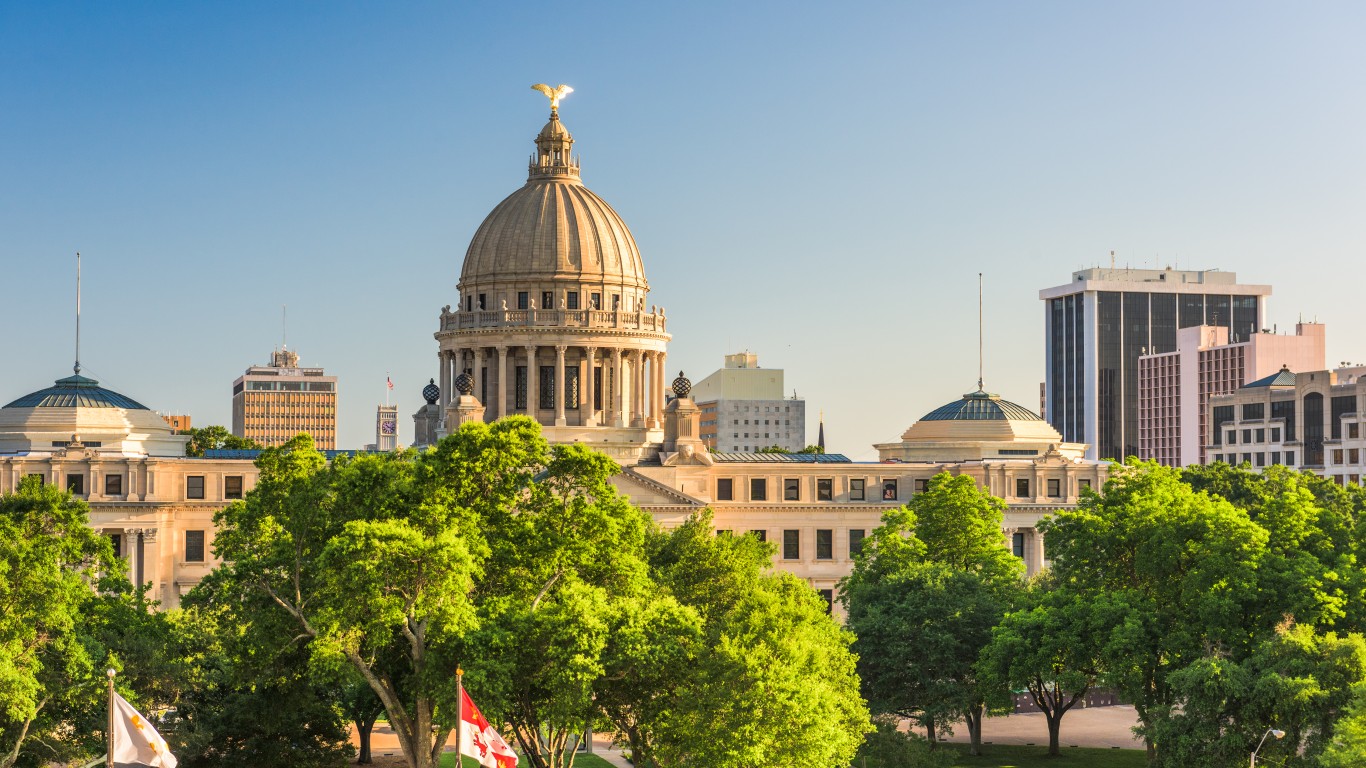
39. Mississippi
> LGBTQ population: 3.5% — 12th lowest (total LGBTQ people: 79,000)
> CenterLink pride centers: 1 per 100,000 LGBTQ people — 12th lowest (total: 1)
Mississippi was one of several states that considered in 2019 bills making schools less accommodating for LGBTQ youth. The state introduced legislation allowing licensed school employees to misgender students. There is a statewide policy that prohibits educators from discussing LGBTQ topics in schools. Any discussion of LGBTQ topics in schools, according to the policy, has to be presented in a negative way.
Schools are not the only places that are unfriendly to the LGBTQ community. It’s legal in Mississippi for state employees and private businesses to deny services to LGBTQ people based on religious objections.
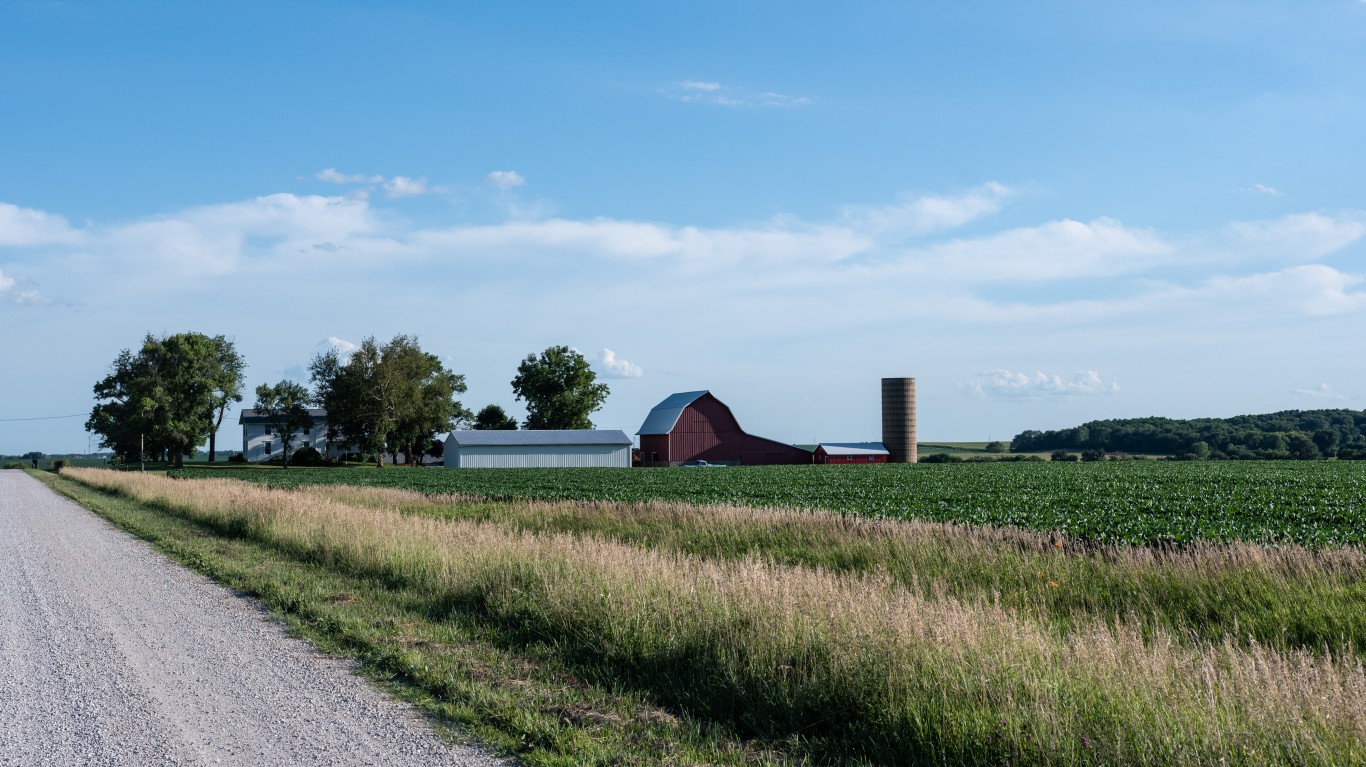
38. Nebraska
> LGBTQ population: 3.8% — 19th lowest (total LGBTQ people: 55,000)
> CenterLink pride centers: 2 per 100,000 LGBTQ people — 20th lowest (total: 1)
While there aren’t many specific laws in Nebraska that allow discrimination based on sexual orientation or gender identity, there aren’t many that prohibit it either. The state does not ban discrimination in the areas of housing, employment, public accomodations, or even bullying based on sexual orientation or gender identity. Nebraska has no ban on transgender exclusions in state medicaid coverage, and it does not provide transgender-inclusive health benefits to state employees either.
On the positive side, though, the state has a law that addresses hate crimes motivated by sexual orientation (but not gender identity), according to the Human Rights Campaign. Omaha is the only city in Nebraska with an ordinance that bans employers, employment agencies, job training programs, labor groups, public accommodations, and businesses that have contracts with the city from discriminating against people based on their sexual orientation or gender identity.
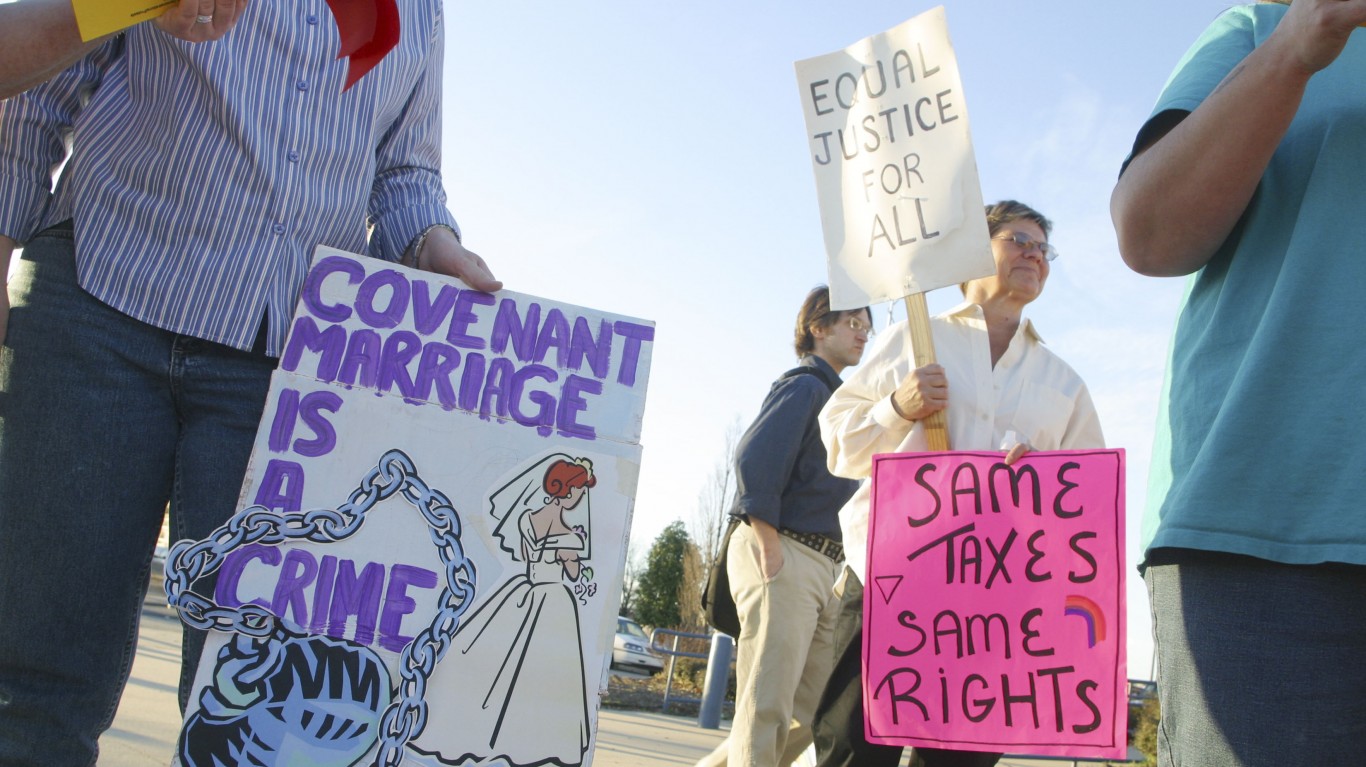
37. Arkansas
> LGBTQ population: 3.3% — 9th lowest (total LGBTQ people: 76,000)
> CenterLink pride centers: N/A
LGBTQ residents in Arkansas may face some legal challenges not experienced by non-LGBTQ residents. The state’s civil rights laws do not include sexual orientation or gender identity. The state has no restrictions on conversion therapy and no law against hate or bias crimes based on sexual orientation and gender identity.
Some parts of Arkansas are friendlier to the gay community than others. Fayetteville, a city of about 87,000 people in the northwest part of the state, for example, organizes one of the largest pride parades in the state. The city has anti-discrimination laws protecting LGBTQ residents. It’s important to note that the state Supreme Court ruled in 2019 that a city could not enforce LGBTQ protections.
[in-text-ad-2]
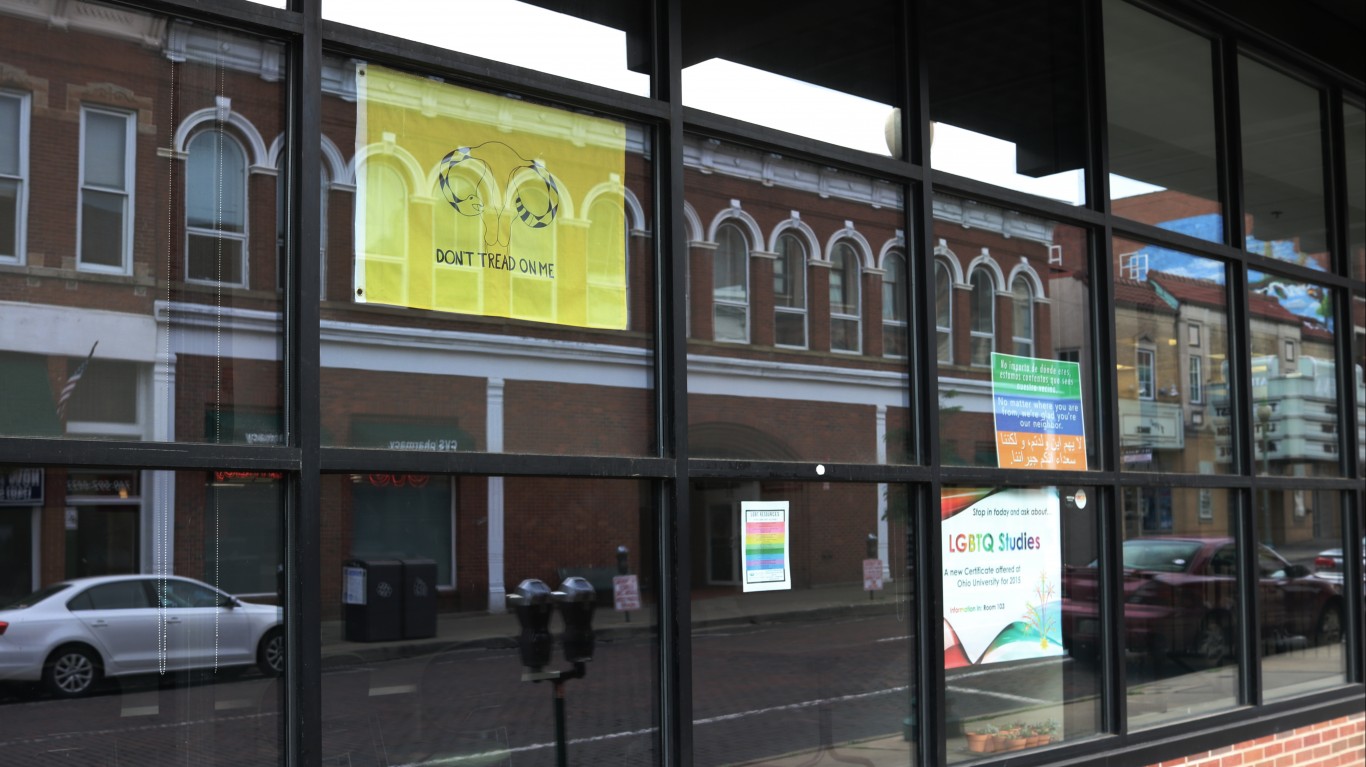
36. Ohio
> LGBTQ population: 4.3% — 19th highest (total LGBTQ people: 389,000)
> CenterLink pride centers: 3 per 100,000 LGBTQ people — 17th highest (total: 10)
Sexual orientation is not included in the list of protected classes under Ohio’s laws against discrimination. The state issues marriage licenses to same-sex couples and allowes LGBTQ people to change their gender on their driver’s license, but Ohio has no laws barring discrimination in housing, employment, or public accomodations. LGBTQ residents are not legally protected against hate crimes.
Bigger cities in the state, such as Columbus, Cincinnati, and Cleveland, are more welcoming to the LGBTQ community. They have passed comprehensive LGBTQ-inclusive protections in the areas of housing, employment, and public accommodations.
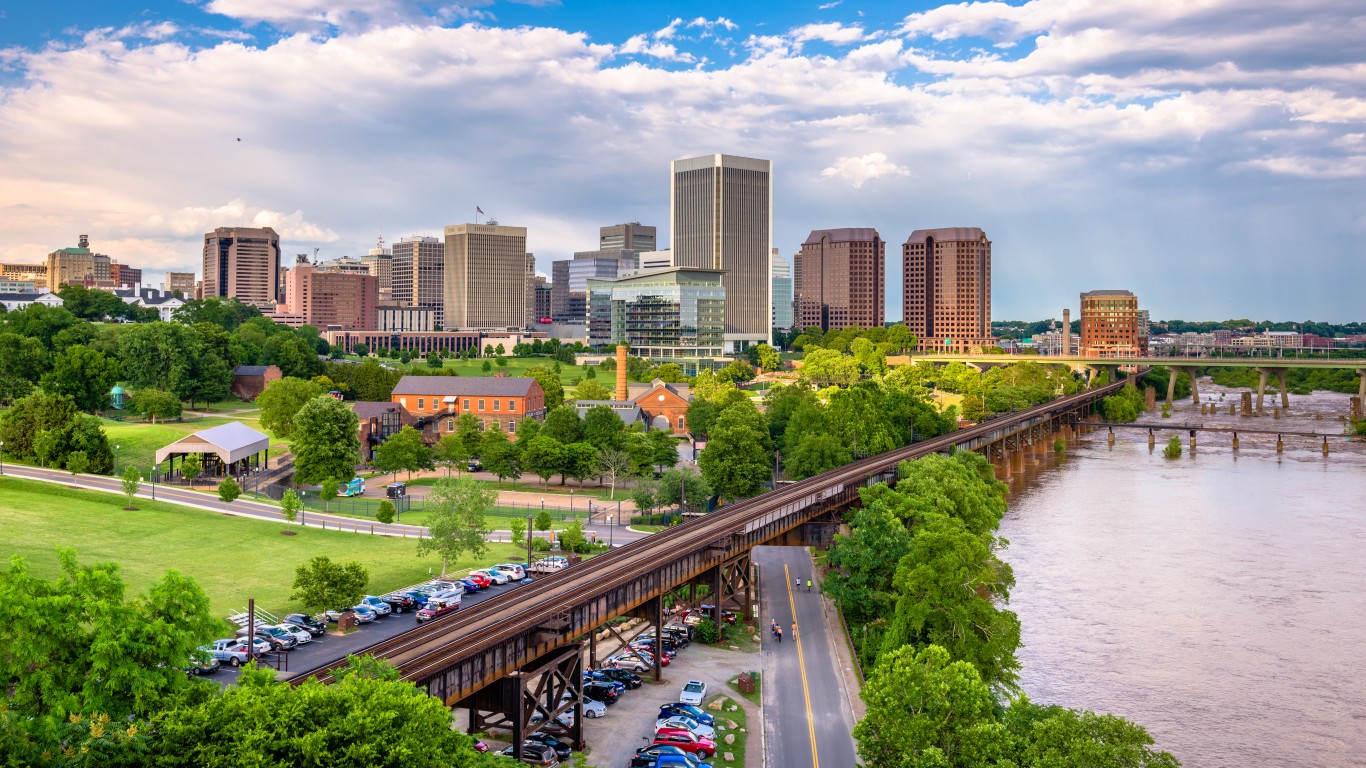
35. Virginia
> LGBTQ population: 3.9% — 22nd lowest (total LGBTQ people: 257,000)
> CenterLink pride centers: 2 per 100,000 LGBTQ people — 24th lowest (total: 5)
Until very recently, Virginia was not making progress toward equality for the LGBTQ community. In April 2020, a few months after the HRC latest report was published, the state passed several laws that provided anti-discrimination protections to the LGBTQ community, making Virginia the first state in the South to do so. The state made it easier for people to update the gender marker on their birth certificate. The laws will take effect July 1.
While progress has been made, LGBTQ residents still face challenges that non-LGBTQ residents do not. Virginia has legal provisions that allow adoption and foster care agencies to turn away prospective LGBTQ parents on the grounds of religious freedom. The state does not have laws protecting students from discrimination in schools based on their sexual orientation or gender identity.
[in-text-ad]

34. Arizona
> LGBTQ population: 4.5% — 12th highest (total LGBTQ people: 242,000)
> CenterLink pride centers: 1 per 100,000 LGBTQ people — 10th lowest (total: 3)
Arizona has no statewide laws preventing discrimination in employment, education, or housing against LGBTQ people. However, the state is making progress, introducing 14 and passing one law in 2019 that the Human Rights Campaign assessed as positive for LGBTQ communities. Five cities — Flagstaff, Phoenix, Sedona, Tempe, and Tucson — have nondiscrimination protections.
Arizona also lacks legislation ensuring that transgender people are included in state Medicaid or that they cannot be banned from insurance. LGBTQ youth also lack many key legal protections, including legally mandated inclusive sex education in schools and protection from conversion therapy.
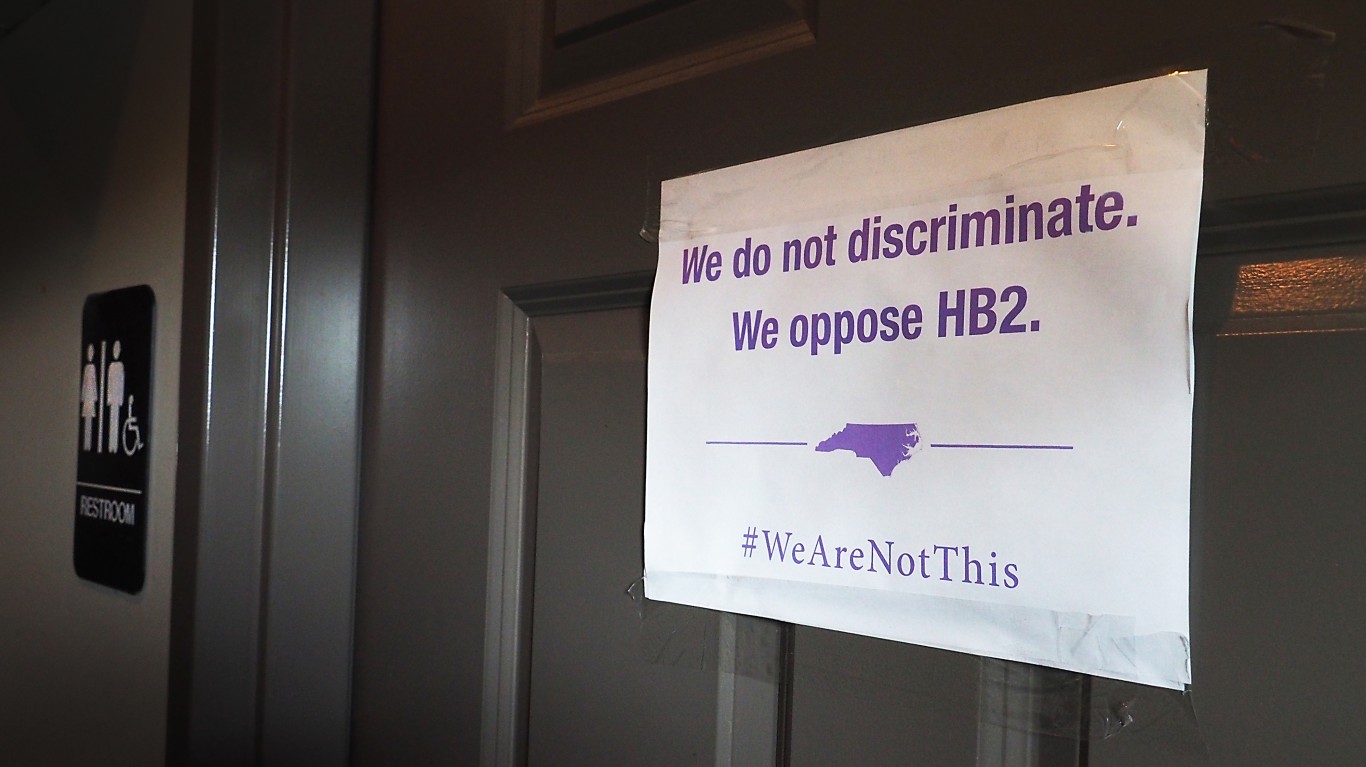
33. North Carolina
> LGBTQ population: 4.0% — 25th lowest (total LGBTQ people: 319,000)
> CenterLink pride centers: 3 per 100,000 LGBTQ people — 19th highest (total: 8)
North Carolina made national news and drew nationwide drew criticism for its “bathroom bill” that stated that transgender people have to use public restrooms in state-run buildings that correspond with the sex on their birth certificates. Little progress has been made since then on the state level.
There are currently no explicit statewide nondiscrimination protections for LGBTQ people in North Carolina, except for state employees and college students. The state does not have a law that specifically bans insurance exclusions for transgender health care. There is also no law that provides state employees with transgender-inclusive health benefits.
Only Charlotte, a major city and commercial hub in North Carolina with a population of about 873,000 people, has legal protections from discriminations based on sexual orientation or gender identity.
32. Missouri
> LGBTQ population: 3.8% — 19th lowest (total LGBTQ people: 180,000)
> CenterLink pride centers: 2 per 100,000 LGBTQ people — 16th lowest (total: 3)
Basic protections that LGBTQ people lack in Missouri include protection of employment, housing, and public accommodations. Missouri has a total of six laws that protect LGBTQ people — hate crime laws, a college and universities nondiscrimination law, a sexual orientation nondiscrimination policy for state employees, an anti-bullying law specifically for cyberbullying, transgender inclusion in sports, and name and gender updates on identification documents for driver’s licenses.
There are, however, five laws that the HRC categorizes as “bad” laws for the LGBTQ community, including laws that criminalize HIV/AIDS, a state Religious Freedom Restoration Act, and transgender exclusions in state Medicaid coverage. There are no parenting laws in the state such as parental presumption for same-sex couples, second parent adoption, or foster care nondiscrimination for LGBTQ people. Missouri also lacks nondiscrimination laws for health insurance.
[in-text-ad-2]
31. Louisiana
> LGBTQ population: 3.9% — 22nd lowest (total LGBTQ people: 139,000)
> CenterLink pride centers: N/A
Aside from New Orleans, where LGBTQ people feel welcome and that hosts one of the largest gay pride parades in the country, an event first held there in 1971, LGBTQ people may face legal challenges that non-LGBTQ residents don’t face. That state has no anti-discrimination laws that protect LGBTQ people in the areas of employment, housing, public accommodations, bullying, education, or transgender health care. There are no restrictions on conversion therapy.
Public opinion on same-sex marriage is not favorable in the state, lagging behind national opinion, according to a 2016 survey by the Louisiana State Univeristy. About 53% of residents are against same-sex marriage, and 41% are in favor. A year before the U.S. Supreme Court ruled that same-sex marriages are legal, Louisiana became the first state to uphold its same-sex marriage ban.
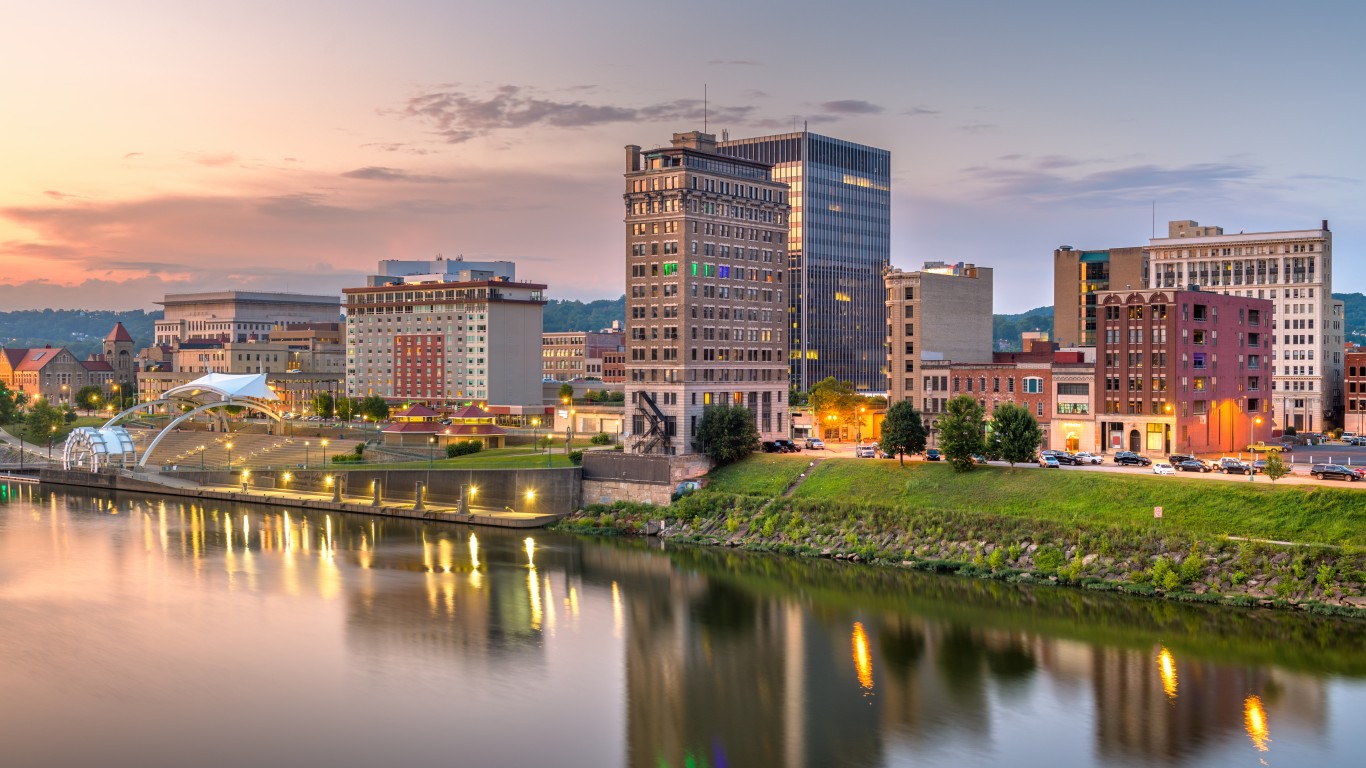
30. West Virginia
> LGBTQ population: 4.0% — 25th lowest (total LGBTQ people: 58,000)
> CenterLink pride centers: 2 per 100,000 LGBTQ people — 17th lowest (total: 1)
Over the last several years, West Virginia lawmakers have tried to update the state’s Human Rights Act to include protections for LGBTQ people, but they have not yet succeeded. Some state officials have openly said they would not support such legislation, prompting state Senate President Mitch Carmichael to say, “[W]e have to get out of this concept in West Virginia that there is something to fear from that segment of our population.” Recently, the state even considered legislation that would prohibit protections for LGBTQ people that don’t already exist under state law.
While no counties in West Virginia have adopted LGBTQ-inclusive nondiscrimination ordinances, 13 cities have adopted full protection based on sexual orientation in private employment, housing, and public accommodations, according to LGBTQ Map, a movement advancement project.
[in-text-ad]
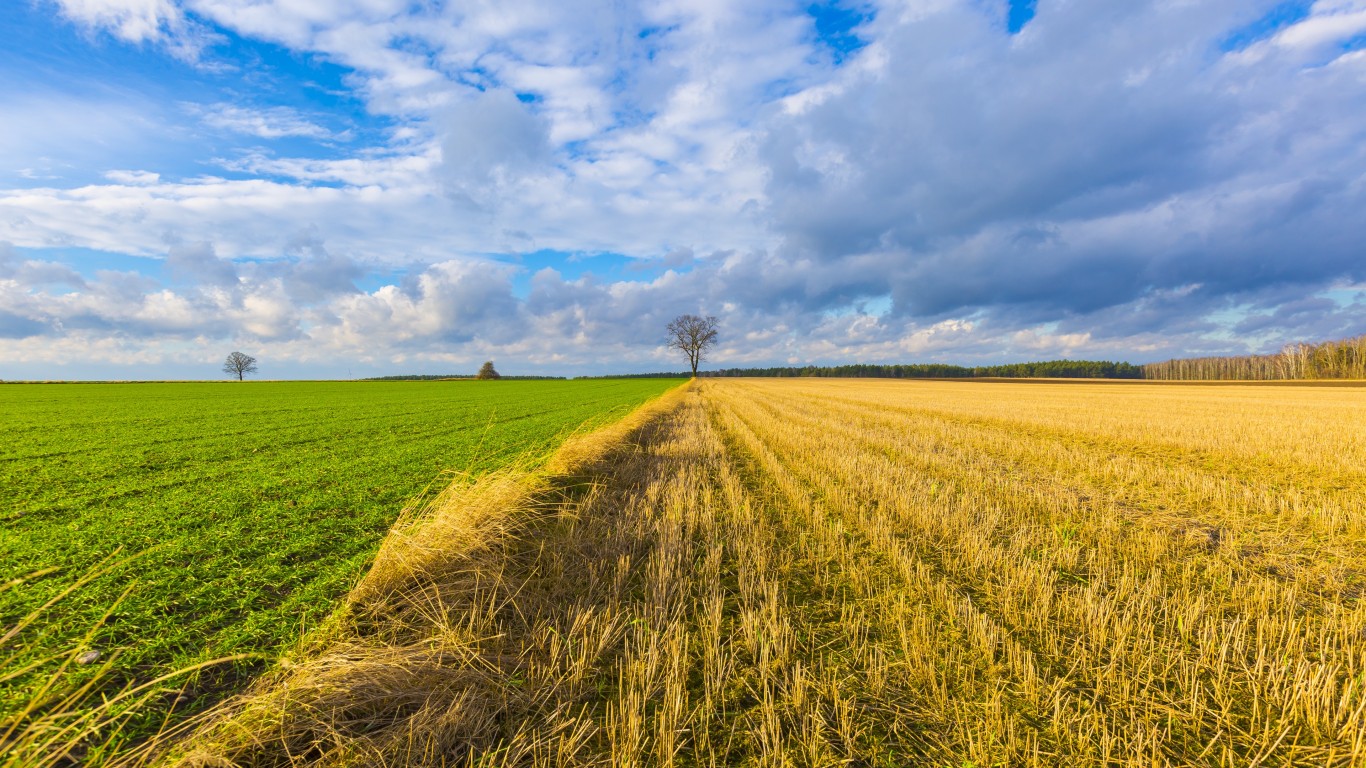
29. Oklahoma
> LGBTQ population: 3.8% — 19th lowest (total LGBTQ people: 113,000)
> CenterLink pride centers: 1 per 100,000 LGBTQ people — 5th lowest (total: 1)
“Oklahoma is considered to be one of the harshest environments for LGBTQ people to live,” according to Allie Shinn, the executive director of Freedom Oklahoma. The state’s civil rights law does not include sexual orientation or gender identity, leaving the LGBTQ community living in Oklahoma vulnerable to discrimination in areas like housing, employment, education, and more.
A 2015 U.S. Transgender Survey found that 26% of transgender respondents from the state had been fired, denied a promotion, or not hired because of their gender identity or expression. Verbal harassment, physical assault, getting evicted, and being denied service because people identify as LGBTQ are common in the state as well, according to the survey.
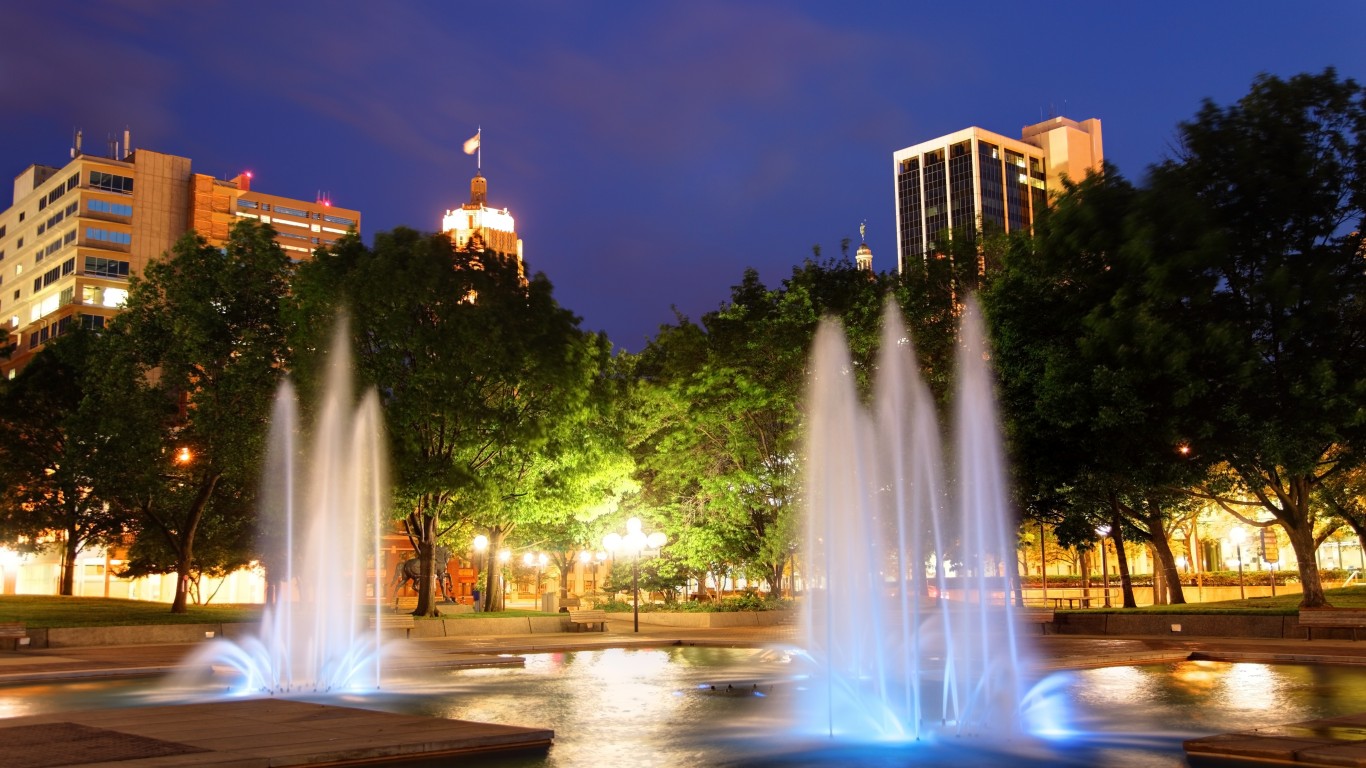
28. Indiana
> LGBTQ population: 4.5% — 12th highest (total LGBTQ people: 229,000)
> CenterLink pride centers: 2 per 100,000 LGBTQ people — 18th lowest (total: 4)
Though Indiana has made some progress in advancing equality of LGBTQ residents by making parental presumption of parentage for same-sex married couples the law, by allowing gender marker updates on driver’s licenses, and by banning discrimination in foster placement of LGBTQ youth, there are currently no comprehensive civil rights protections in place for LGBTQ individuals at the state level.
In 2015, then-Gov. Mike Pence signed a religious freedom bill, causing national uproar. The law has been interpreted as fostering discrimination by allowing businesses to deny services to LGBTQ residents.
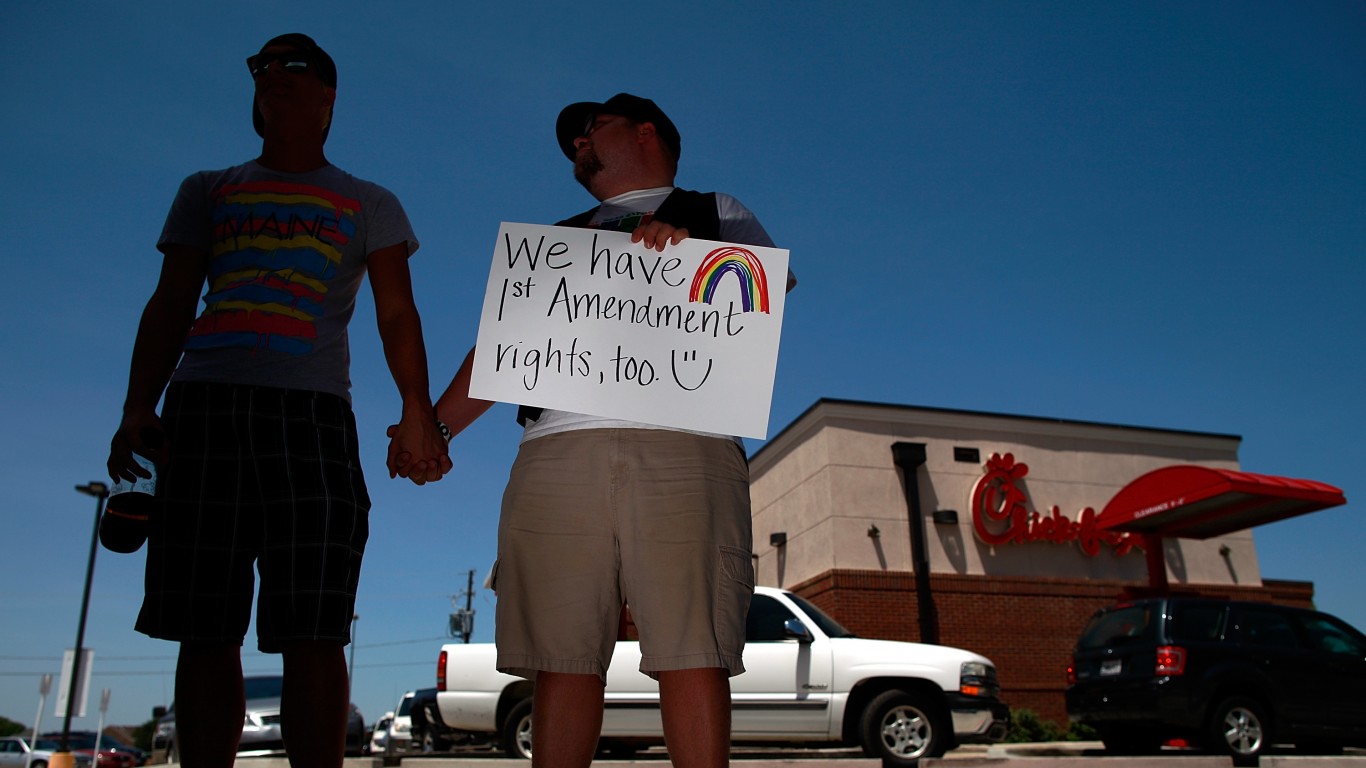
27. Texas
> LGBTQ population: 4.1% — 22nd highest (total LGBTQ people: 858,000)
> CenterLink pride centers: 2 per 100,000 LGBTQ people — 19th lowest (total: 15)
Texas lacks statewide nondiscrimination laws protecting LGBTQ people in virtually all areas, including employment, housing, education, adoption, state employees, and more. It is also one of 10 states that permits child welfare organizations to discriminate against potential LGBTQ parents in adoptions based on religious objections.
Still, the capital of Texas, Austin, is considered one of the most LGBTQ-friendly cities in America. Several other major Texas cities — including Dallas, San Antonio, and El Paso — protect people from discrimination on the basis of their sexual orientation and gender identity.
[in-text-ad-2]
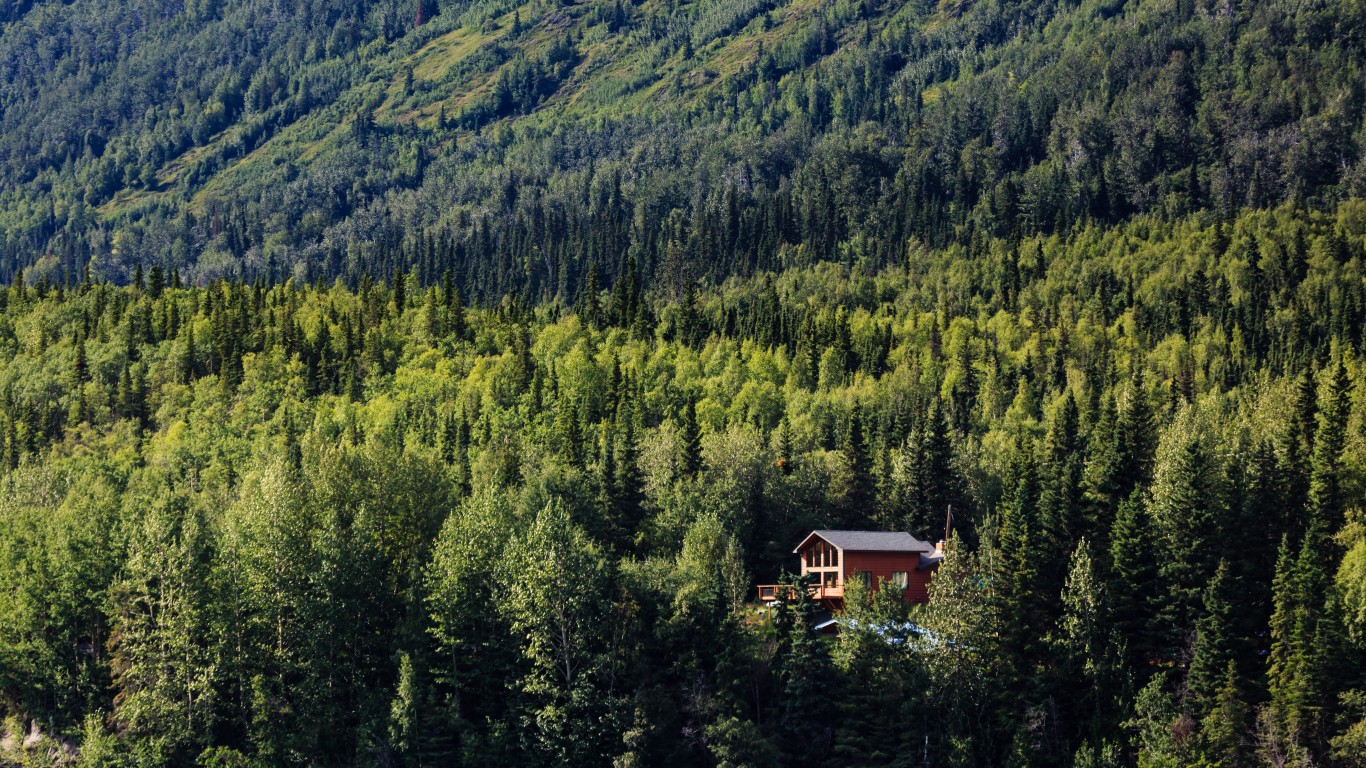
26. Alaska
> LGBTQ population: 3.7% — 15th lowest (total LGBTQ people: 21,000)
> CenterLink pride centers: 5 per 100,000 LGBTQ people — 5th highest (total: 1)
Though several large cities in Alaska have passed local laws protecting LGBTQ residents from discrimination in several areas, there are no statewide nondiscrimination laws, except when it comes to colleges and universities. In terms of health and safety, a “bad” law, as defined by the HRC, explicitly allows for transgender exclusions in state Medicaid coverage.
The state has more Pride centers affiliated with CenterLink, a network of pride and community centers around the country, than most other states. There are five such establishments per 100,000 LGBTQ residents, the fifth highest rate in the country.

25. Pennsylvania
> LGBTQ population: 4.1% — 22nd highest (total LGBTQ people: 416,000)
> CenterLink pride centers: 5 per 100,000 LGBTQ people — 3rd highest (total: 22)
Philadelphia is among the friendliest cities to LGBTQ people. The City of Brotherly Love was even among the first places in the U.S. to have a gay pride parade, in 1972. Outside of Philly, however, Pennsylvania is not so friendly. The state lacks basic nondiscrimination laws, leaving LGBTQ people vulnerable to being fired or denied housing.
However, Pennsylvania does offer protection in a few areas, including trans health care, state Medicaid, colleges, and adoption. The state introduced bills to prohibit LGBTQ “panic” defense, which uses the victim’s sexual orientation or gender expression to justify the defendant’s violent reaction to the victim.
[in-text-ad]
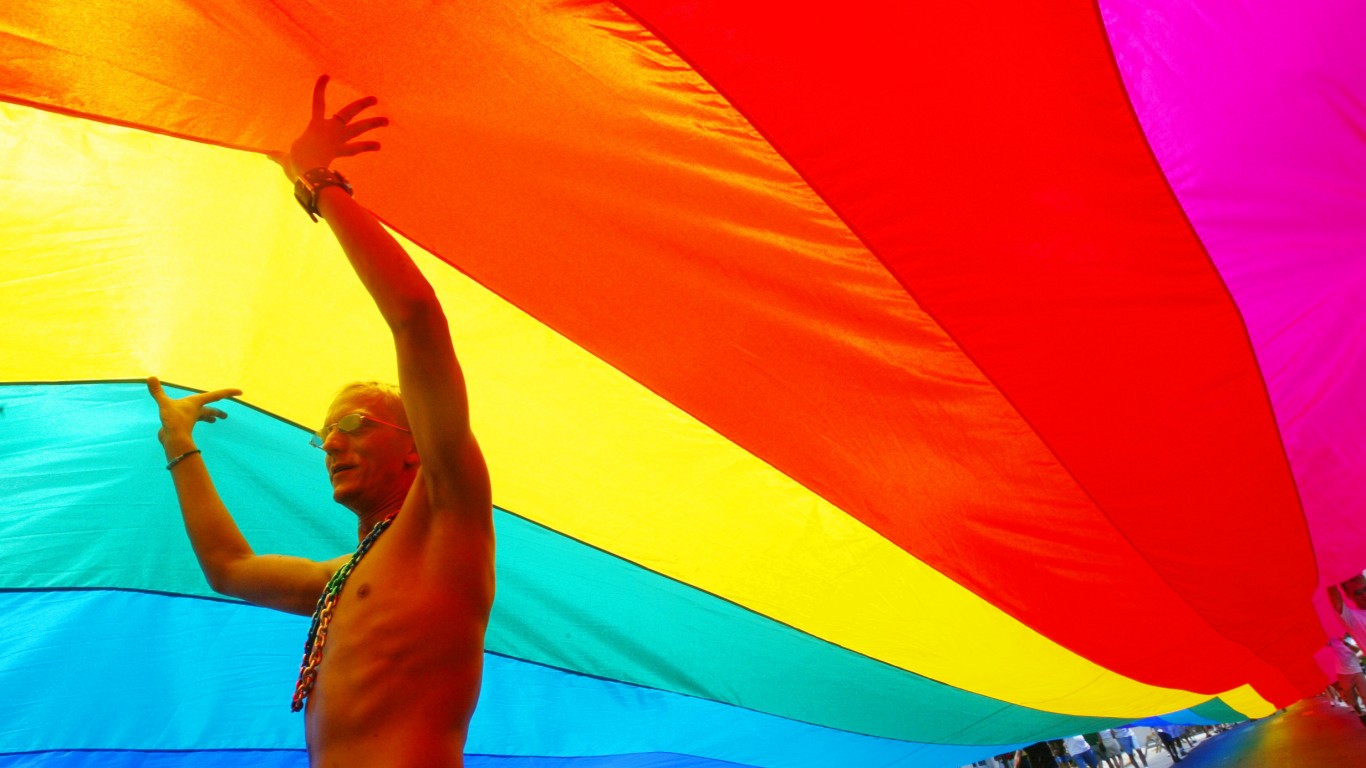
24. Florida
> LGBTQ population: 4.6% — 10th highest (total LGBTQ people: 772,000)
> CenterLink pride centers: 2 per 100,000 LGBTQ people — 20th highest (total: 19)
Florida lacks nondiscrimination laws in every area considered by the Human Rights Campaign, including employment, housing, education, adoption, higher education, insurance, and more. Florida is also one of just a handful of states that has not repealed its laws forbidding certain sexual practices, despite the U.S. Supreme Court ruling those laws unconstitutional in 2003.
Florida has one of the lower rates of hate crimes motivated by gender identity or sexual orientation. However, it was the site of the deadliest attack on LGBTQ people in American history, when in 2016 a gunman killed 49 people and injured dozens more at the Pulse gay nightclub in Orlando.
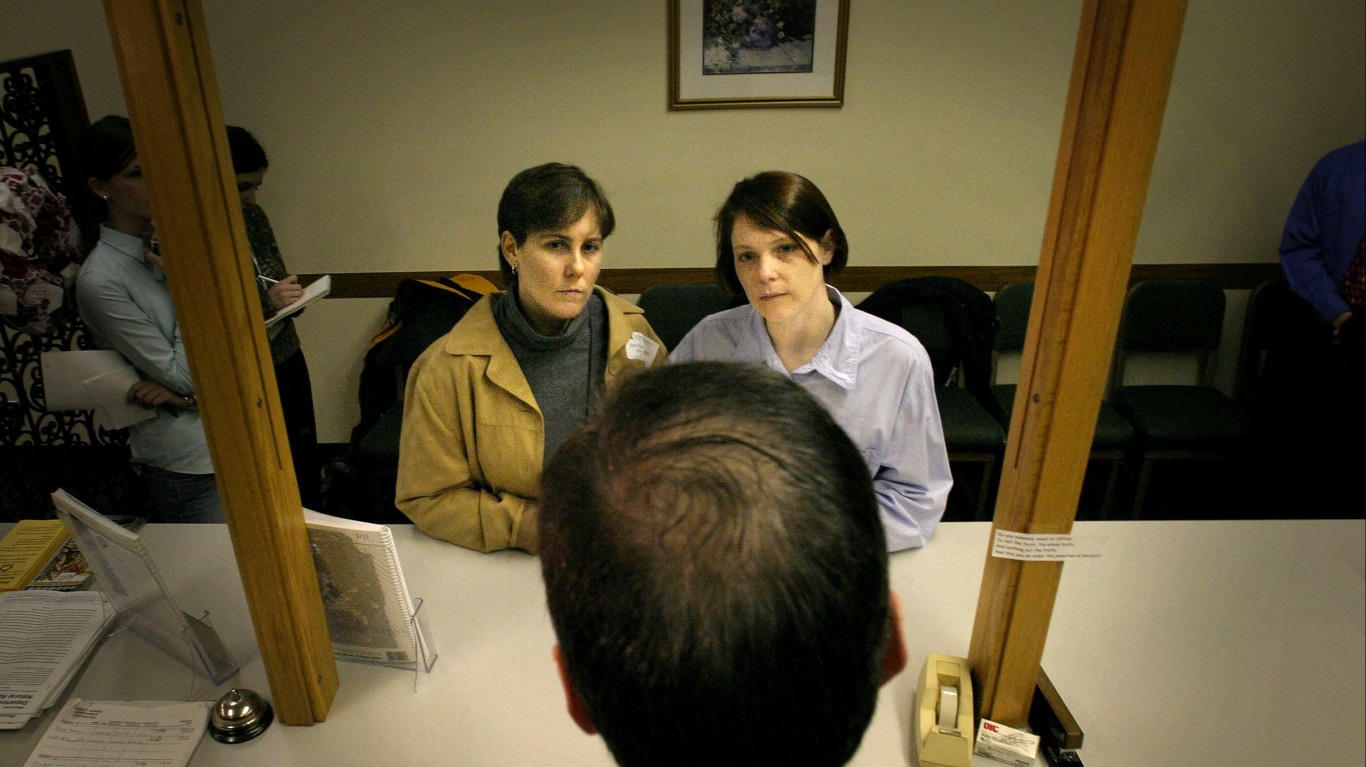
23. Wisconsin
> LGBTQ population: 3.8% — 19th lowest (total LGBTQ people: 171,000)
> CenterLink pride centers: 2 per 100,000 LGBTQ people — 22nd highest (total: 4)
Similar to several other states that don’t rank among the friendliest for the LGBTQ residents, Wisconsin has at least one LGBTQ friendly city. Madison has had active organizations for homosexual rights at least since the late 1970s. The city extends protections to employment, housing, and public accommodations, and its school district has a liaison for LGBTQ students.
Statewide, however, Wisconsin offers protection against discrimination based on sexual orientation but not gender identity. The state does not have a law against harassment or bullying of LGBTQ people, and there is no ban on insurance exclusions for transgender health care or a policy providing transgender health benefits to state employees.
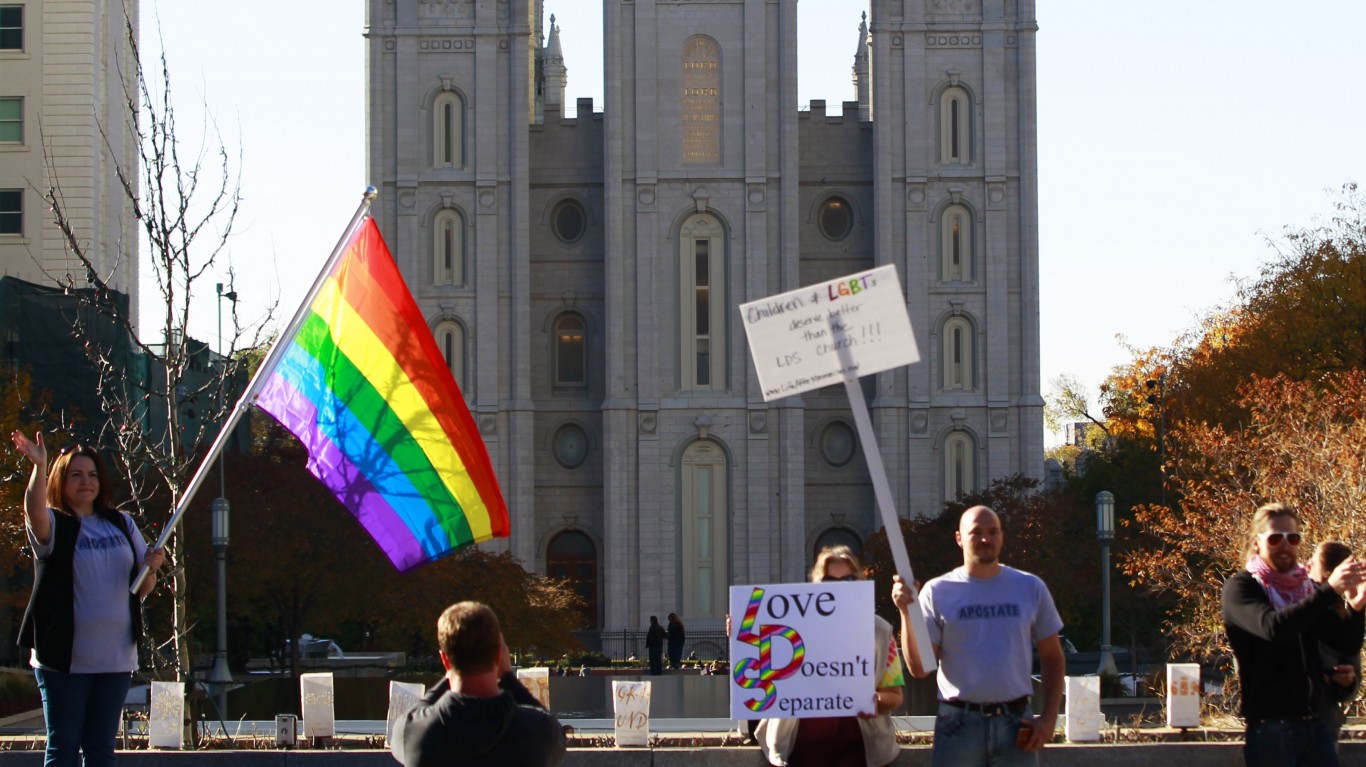
22. Utah
> LGBTQ population: 3.7% — 15th lowest (total LGBTQ people: 80,000)
> CenterLink pride centers: 1 per 100,000 LGBTQ people — 11th lowest (total: 1)
LGBTQ people in Utah have just one pride center at their disposal. The state has laws protecting people from discrimination, on the basis of both sexual orientation and gender identity, in the areas of employment, housing, adoption, and higher education.
However, Utah has no health and safety laws for members of the LGBTQ community. There are no laws ensuring transgender people are included in health care coverage and no laws allowing updates to gender markers on birth certificates or drivers licenses.
[in-text-ad-2]
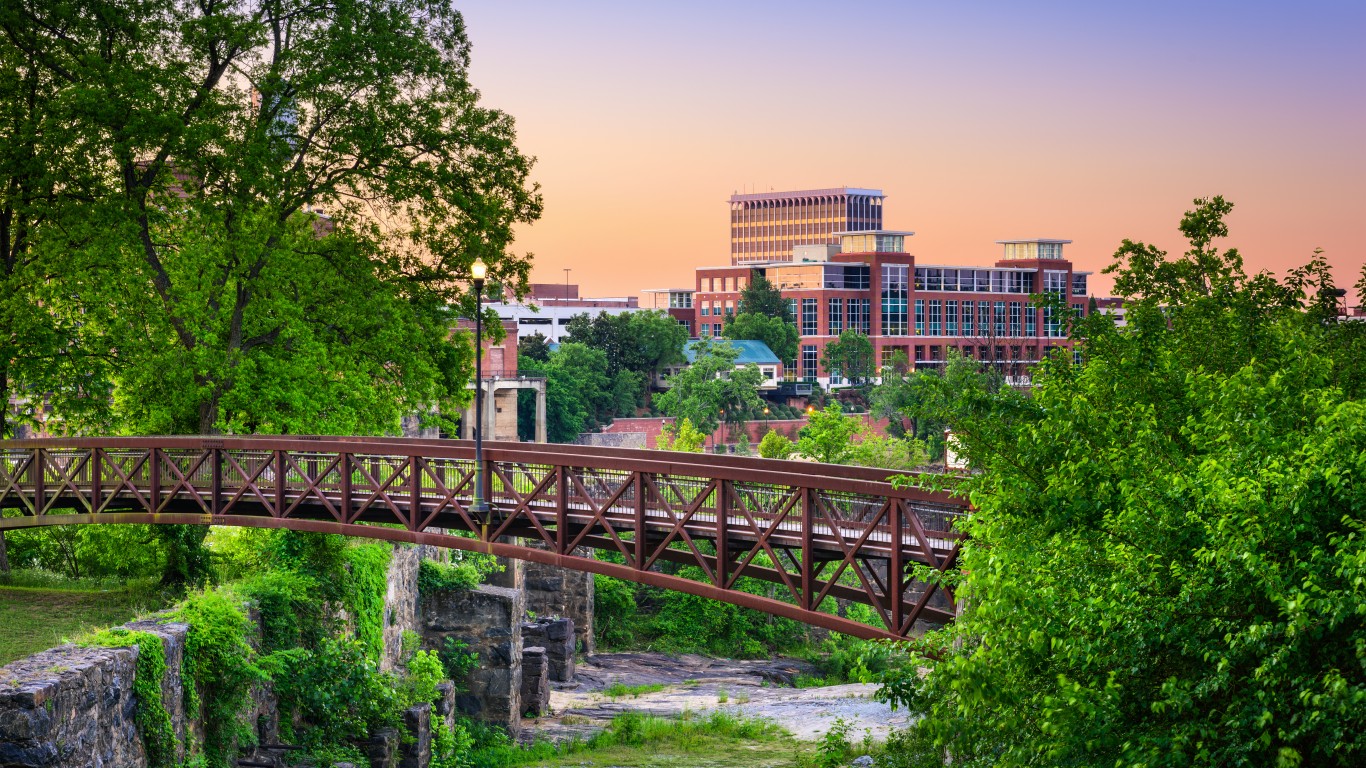
21. Georgia
> LGBTQ population: 4.5% — 12th highest (total LGBTQ people: 356,000)
> CenterLink pride centers: 1 per 100,000 LGBTQ people — 8th lowest (total: 4)
Georgia has no statewide laws or specific policy addressing hate crimes, parenting, discrimination, or relationship recognitions based on one’s sexual orientation or gender identity. The state does not offer the possibility of changing one’s gender on a driver’s license or birth certificate, and it has a law allowing for transgender exclusions in state Medicaid coverage.
On a more positive note, progress toward equality may not be far into the future. About two-thirds of Georgia residents favor basic nondiscrimination laws that would protect LGBTQ people in employment, public accommodations, and housing, while less than a third are opposed, according to the Public Religion Research Institute.

20. Hawaii
> LGBTQ population: 4.6% — 10th highest (total LGBTQ people: 52,000)
> CenterLink pride centers: 2 per 100,000 LGBTQ people — 23rd lowest (total: 1)
Hawaii has comprehensive employment protections for LGBTQ residents after including transgender people in legislation in 2011. It also has nondiscrimination laws in housing, education, and foster care.
In 2019, Hawaii was one of five states to outlaw LGBTQ “panic” defenses, which are legal strategies that blame violent hate crime victims for attacks committed against them because of their sexual orientation or gender identity.
[in-text-ad]

19. Washington
> LGBTQ population: 5.2% — 5th highest (total LGBTQ people: 300,000)
> CenterLink pride centers: 2 per 100,000 LGBTQ people — 25th highest (total: 6)
Washington is among a handful of states that have introduced bills to ban LGBTQ “panic” defenses, which, the HRC argues, legitimizes violence against LGBTQ people and prevents them from receiving equal justice. Washington had the highest ratio of hate crimes motivated by sexual orientation or gender per 100,000 people in 2018. While such crimes tend to be grossly underreported, Washington hate crime laws are enumerated for sexual orientation and gender identity and police departments are required by law to report hate crime statistics — both are considered positive laws by the Human Rights Campaign.
Though it has more work to do, Washington has made significant progress toward equality from a civil rights point of view. The state has nondiscrimination laws covering housing, employment, relationship recognition, hate crimes, public accommodations, education, and bullying in school. LGBTQ youth are protected from conversion therapy, and LGBTQ residents are allowed to change their gender on driver’s licenses and birth certificates.
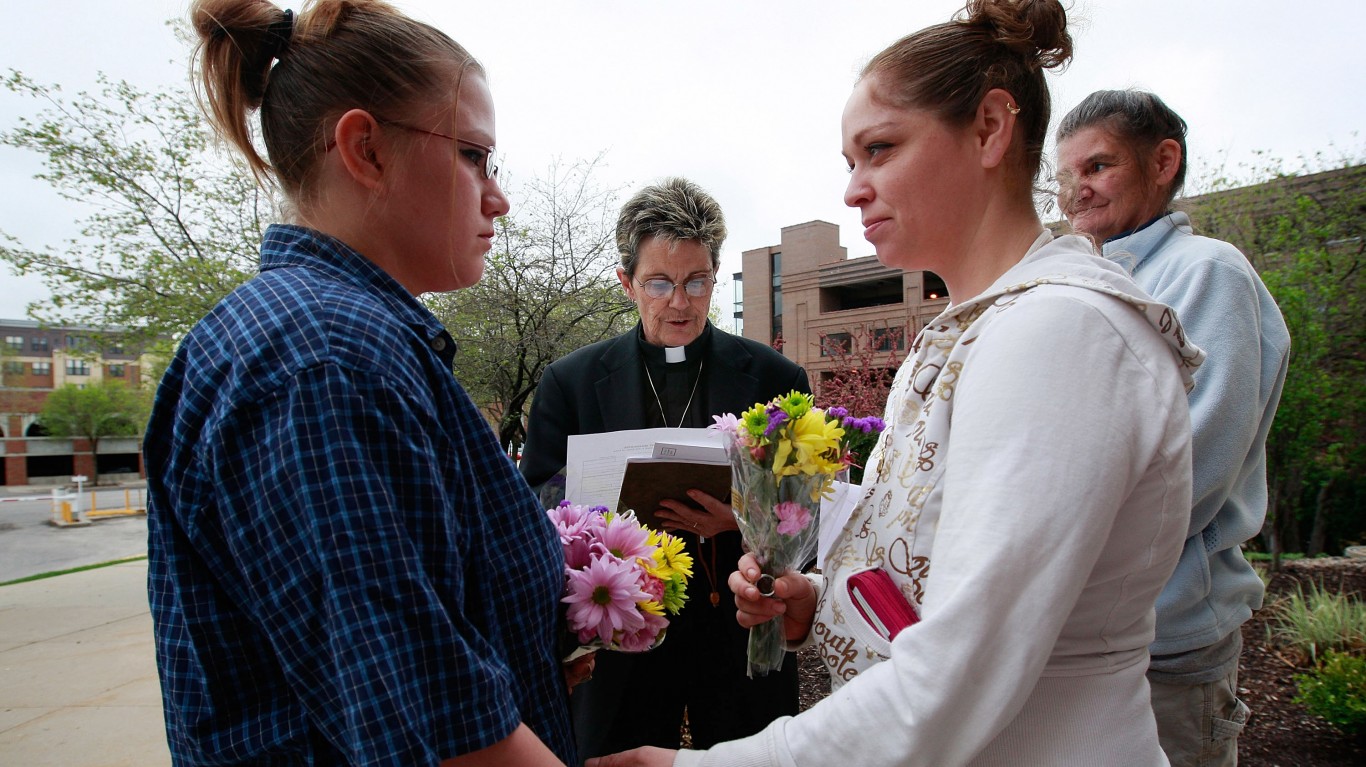
18. Iowa
> LGBTQ population: 3.6% — 13th lowest (total LGBTQ people: 87,000)
> CenterLink pride centers: 1 per 100,000 LGBTQ people — 9th lowest (total: 1)
Though politicians recently removed transgender health care benefits from the state’s medical plan, several bills were introduced about enforcing nondiscrimination rules on college campuses. Iowa has several statewide nondiscrimination laws covering employment, housing, public accommodations, insurance, and credit, though religious exemptions are also legal.
The number of reported hate crimes per 100,000 LGBTQ people in the state is among the lowest in the country. However, that may be partially due to the fact that laws regarding hate crimes targeting the LGBTQ community cover only sexual orientation.

17. New Jersey
> LGBTQ population: 4.1% — 22nd highest (total LGBTQ people: 288,000)
> CenterLink pride centers: 3 per 100,000 LGBTQ people — 9th highest (total: 9)
New Jersey has nondiscrimination laws that protect LGBTQ people in the areas of housing, employment, education, and public accommodations. It also recently passed a law prohibiting the placement of LGBTQ people, among other vulnerable people, in solitary confinement.
New Jersey is among a few states in the country that recently passed laws that aim to create more inclusive school curriculums by incorporating political, economic, and cultural contributions of LGBTQ people.
[in-text-ad-2]

16. Connecticut
> LGBTQ population: 3.9% — 22nd lowest (total LGBTQ people: 111,000)
> CenterLink pride centers: 3 per 100,000 LGBTQ people — 15th highest (total: 3)
Connecticut ranks among the better states for LGBTQ people in large part because of its wide-ranging legal protections. The state has multiple laws protecting LGBTQ youth and adults from discrimination, as well as their abilities to adopt. It also has strong hate crime laws and thorough health and safety laws.
However, Connecticut does allow for religious exemptions from nondiscrimination laws based on both sexual orientation and gender identity. It also has a higher share of LGBTQ-related hate crimes per 100,000 people than most other states.
15. Minnesota
> LGBTQ population: 4.1% — 22nd highest (total LGBTQ people: 175,000)
> CenterLink pride centers: 1 per 100,000 LGBTQ people — 4th lowest (total: 1)
Minnesota has been on other lists of the country’s most LGBT-friendly states in the past. The HRC recognized in older reports several major cities in the state for their comprehensive policies â which have now been implemented statewide — protecting the LGBTQ community. Minneapolis has even been called the “gayest city in America” by Advocate, the national gay news magazine.
Though the state has no restrictions on conversion therapy, it has a law that addresses hate or bias crimes based on sexual orientation and gender identity and the bullying of LGBTQ students. The state does not allow the exclusion of transgender health care and allows LGBTQ people to change their gender on driver’s licenses and birth certificates.
[in-text-ad]
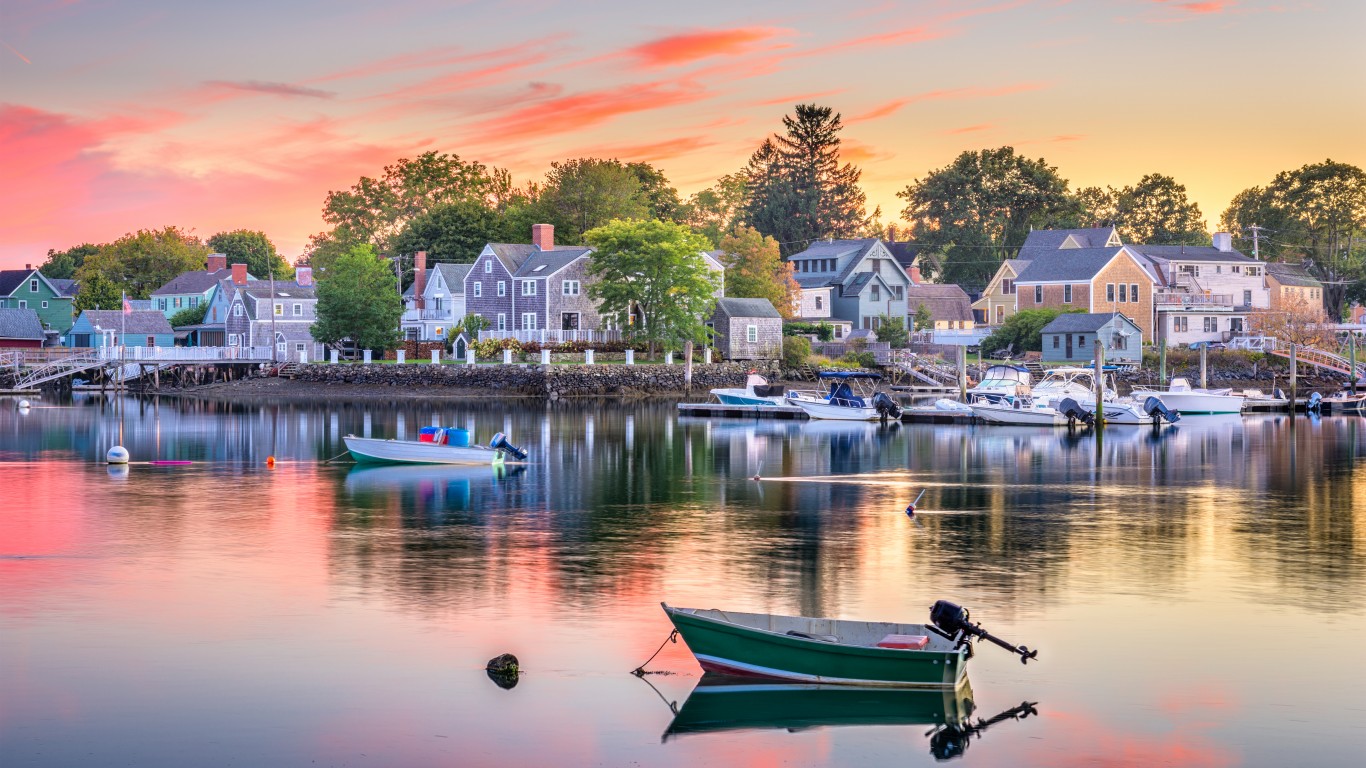
14. New Hampshire
> LGBTQ population: 4.7% — 9th highest (total LGBTQ people: 51,000)
> CenterLink pride centers: 2 per 100,000 LGBTQ people — 25th lowest (total: 1)
New Hampshire has some of the highest concentrations of LGBTQ people relative to the total total population as well as some of the lowest rates of reported hate crimes against the LGBTQ community. The state was regarded as a friendlier state to LGBTQ people compared to most other states by a recent PRRI poll, which showed high support for sex-marriage and LGBTQ rights in general.
Though the state does not have a law that addresses discrimination against students based on sexual orientation and gender identity, New Hampshire also does not have a ban on insurance exclusions for transgender health care.

13. Massachusetts
> LGBTQ population: 5.4% — 3rd highest (total LGBTQ people: 296,000)
> CenterLink pride centers: 1 per 100,000 LGBTQ people — 6th lowest (total: 3)
Massachusetts is one of just a handful of states in which more than 5% of state residents identify as LGBTQ. The state has numerous laws and protections for members of the community. It also has no laws on the books considered “bad” by the HRC — laws that could restrict the freedoms or protections of LGBTQ people.
Massachusetts has a very high rate of hate crimes based on gender identity or sexual orientation — the second highest rate overall. This is likely due in large part to state laws requiring police departments to report hate crime statistics, as well as laws that enumerate crimes motivated by both sexual orientation and gender identity.
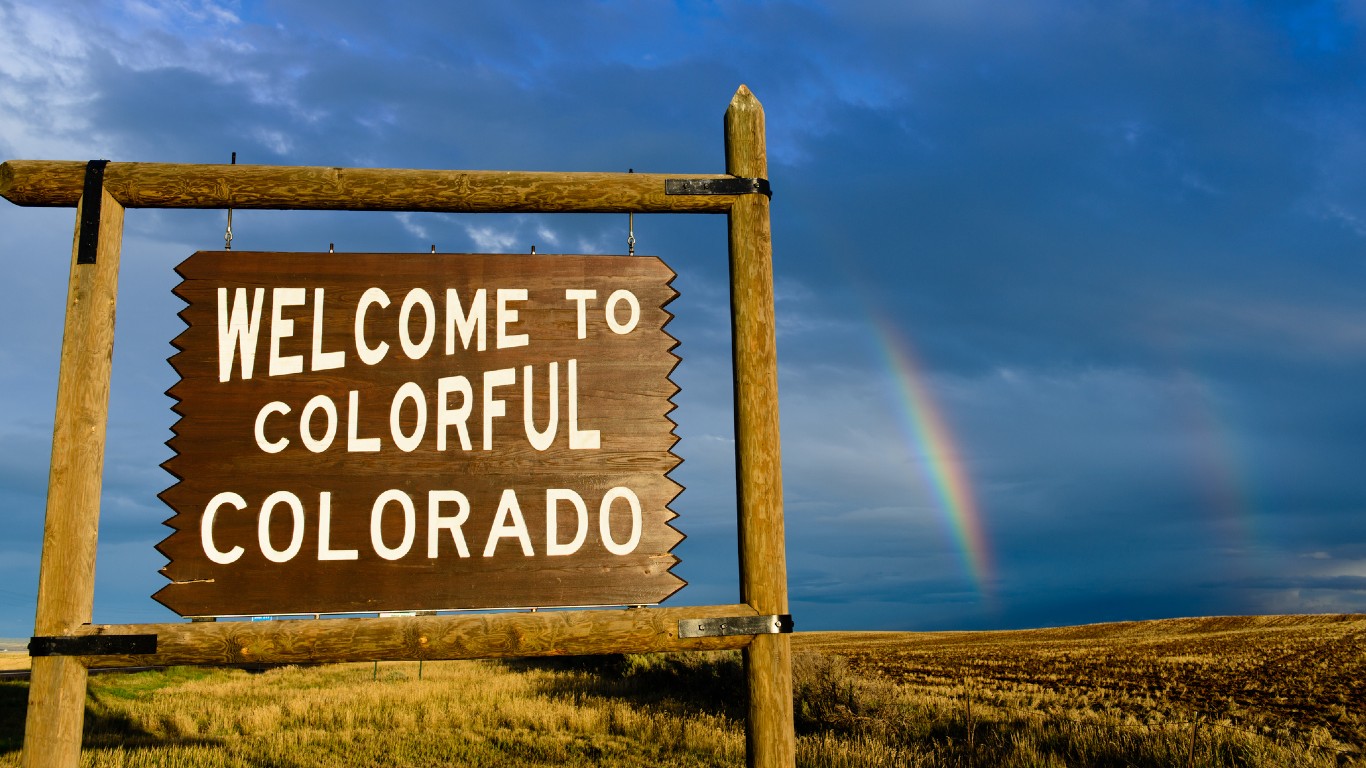
12. Colorado
> LGBTQ population: 4.5% — 12th highest (total LGBTQ people: 200,000)
> CenterLink pride centers: 3 per 100,000 LGBTQ people — 10th highest (total: 6)
Colorado was one of a few states that took steps in 2019 to restrict conversion therapies. Health care providers are barred from trying such practices on LGBTQ youth. The state also passed several bills to make schools safer for LGBTQ students and to create more inclusive curriculums.
Colorado has no laws that the HRC identifies as “bad.” LGBTQ residents in Colorado cannot be denied housing or be evicted and cannot be fired or denied employment because of their sexual orientation or gender identity. The state allows gender marker updates on both driver’s licenses and birth certificates.
[in-text-ad-2]
11. Maryland
> LGBTQ population: 4.2% — 21st highest (total LGBTQ people: 198,000)
> CenterLink pride centers: 2 per 100,000 LGBTQ people — 14th lowest (total: 3)
Maryland is one of 17 states that are in the HRC’s highest-ranked category of “working toward innovative equality.” The state has nondiscrimination laws protecting the LGBTQ community in housing, employment, and public accommodations. Maryland bans exclusions for transgender health care, and provides transgender health benefits to state employees.
State school officials are working on curriculum standards for history classes that will include lessons about LGBTQ and the community’s fight for civil rights. Maryland also has a law that addresses bullying of students based on their sexual orientation or gender expression.
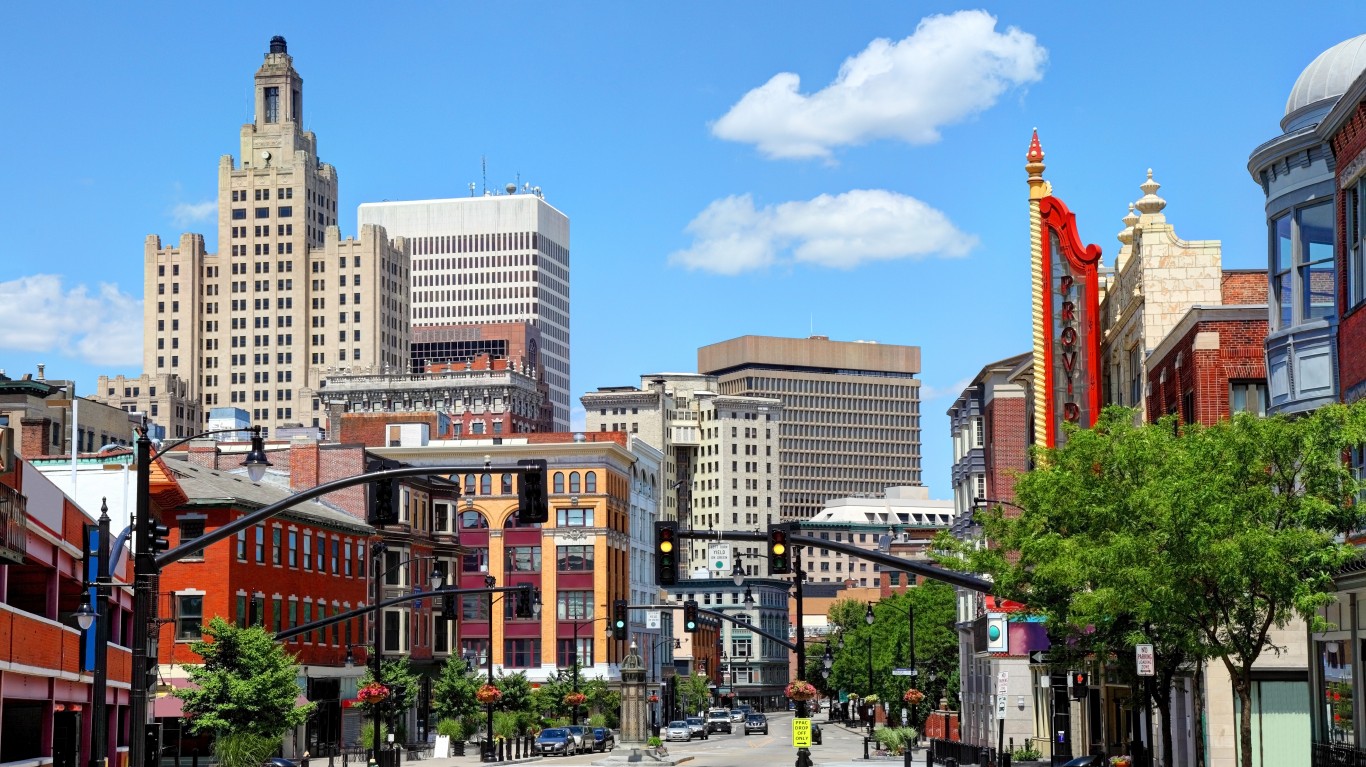
10. Rhode Island
> LGBTQ population: 4.5% — 12th highest (total LGBTQ people: 38,000)
> CenterLink pride centers: 3 per 100,000 LGBTQ people — 16th highest (total: 1)
Rhode Island ranks as one of the 10 best states for LGBTQ people largely because of the health and safety laws protecting the community. It has laws providing protections for health care through the Affordable Care Act, ensuring that transgender people cannot be excluded from health care. The state also collects data on the health and well being of LGBTQ youth and adults.
Rhode Island has improved protections for LGBTQ people substantially in recent years. Over the past decade, it has passed 17 such bills. No bills that sought to restrict freedom or protections for LGBTQ people have even been introduced since 2015, according to HRC.
[in-text-ad]
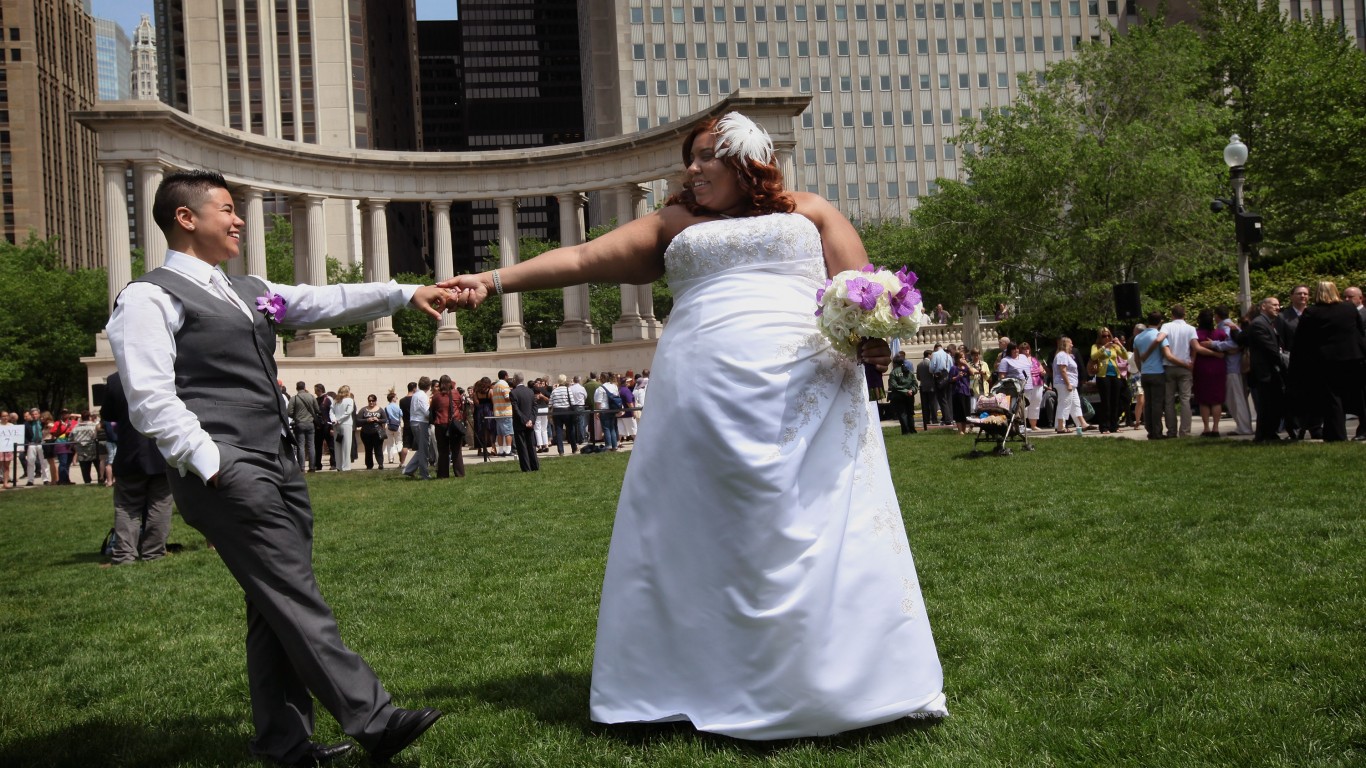
9. Illinois
> LGBTQ population: 4.3% — 19th highest (total LGBTQ people: 426,000)
> CenterLink pride centers: 2 per 100,000 LGBTQ people — 21st lowest (total: 8)
Illinois is one of three states that recently passed a law designating all public single-occupancy restrooms as gender neutral. Illinois is also one of eight states that have banned LGBTQ “panic” defenses, which the HRC considers an important step towards ending the legitimization of violence against LGBTQ people.
In general, Illinois is considered one of the most progressive states in the country. Last year, the state became the fifth in the U.S. to pass a law requiring schools to teach LGBTQ history and include the positive contributions of lesbian, gay, bisexual, and transgender people in their curriculum.

8. Maine
> LGBTQ population: 4.9% — 8th highest (total LGBTQ people: 53,000)
> CenterLink pride centers: 2 per 100,000 LGBTQ people — 22nd lowest (total: 1)
Maine made great strides in 2019, passing five bills protecting the health and rights of its LGBTQ residents. It has among the strongest laws against hate crimes, which include eliminating “panic” defenses, making it mandatory to report such incidents, and prohibiting profiling by law enforcement.
Maine also has no laws on the books considered “bad” by the HRC, including religious and moral exemptions to anti-discrimination laws.
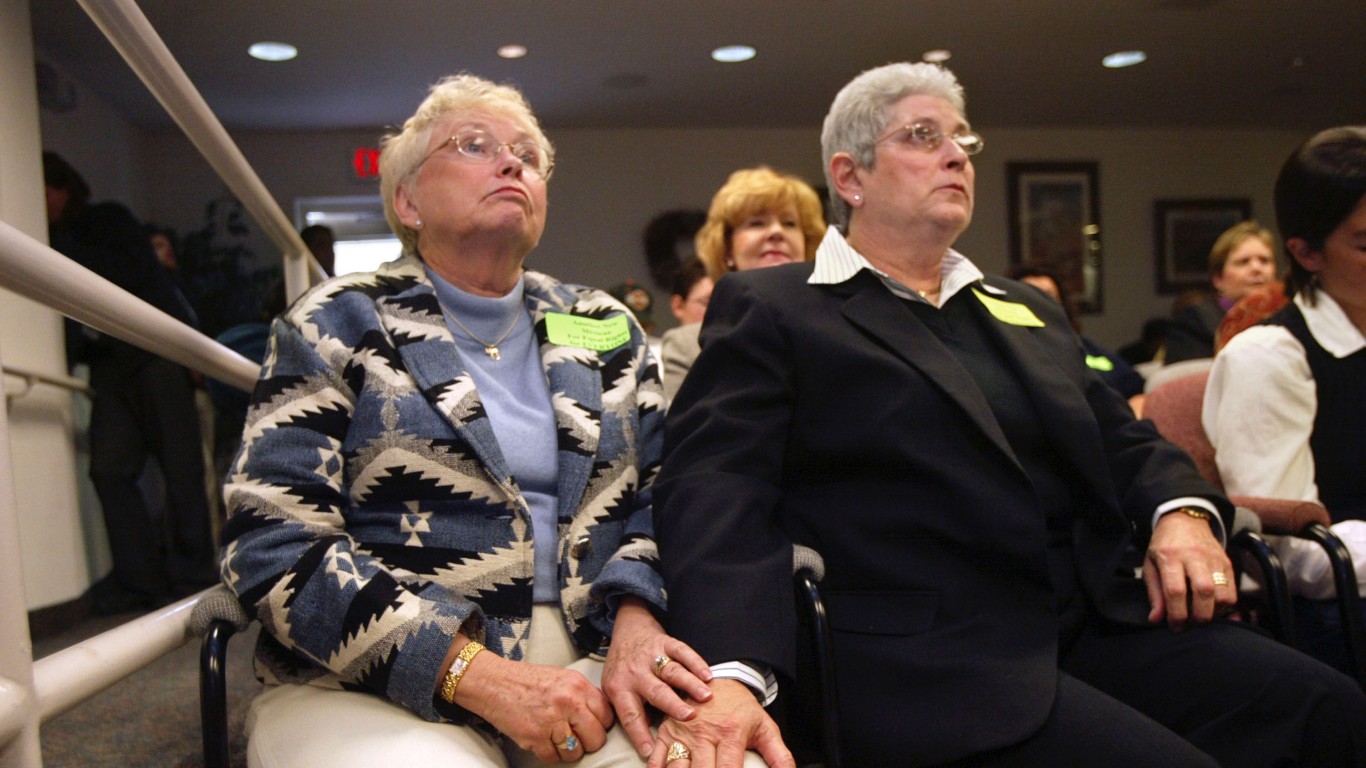
7. New Mexico
> LGBTQ population: 4.5% — 12th highest (total LGBTQ people: 72,000)
> CenterLink pride centers: 3 per 100,000 LGBTQ people — 13th highest (total: 2)
Like Illinois, New Mexico has designated all public single-occupancy restrooms as gender neutral and has banned LGBTQ “panic” defenses. The state protects LGBTQ people from discrimination in many areas, including employment, housing, and public accommodations. However, New Mexico has no state laws, administrative policies, or court decisions that explicitly ban discrimination in jury selection on the basis of sexual orientation or gender identity.
The only “bad” law, according to the HRC is the State Religious Freedom Restoration Act that undermines state nondiscrimination protections as marriage-service providers can discriminate on the basis of their religion.
[in-text-ad-2]
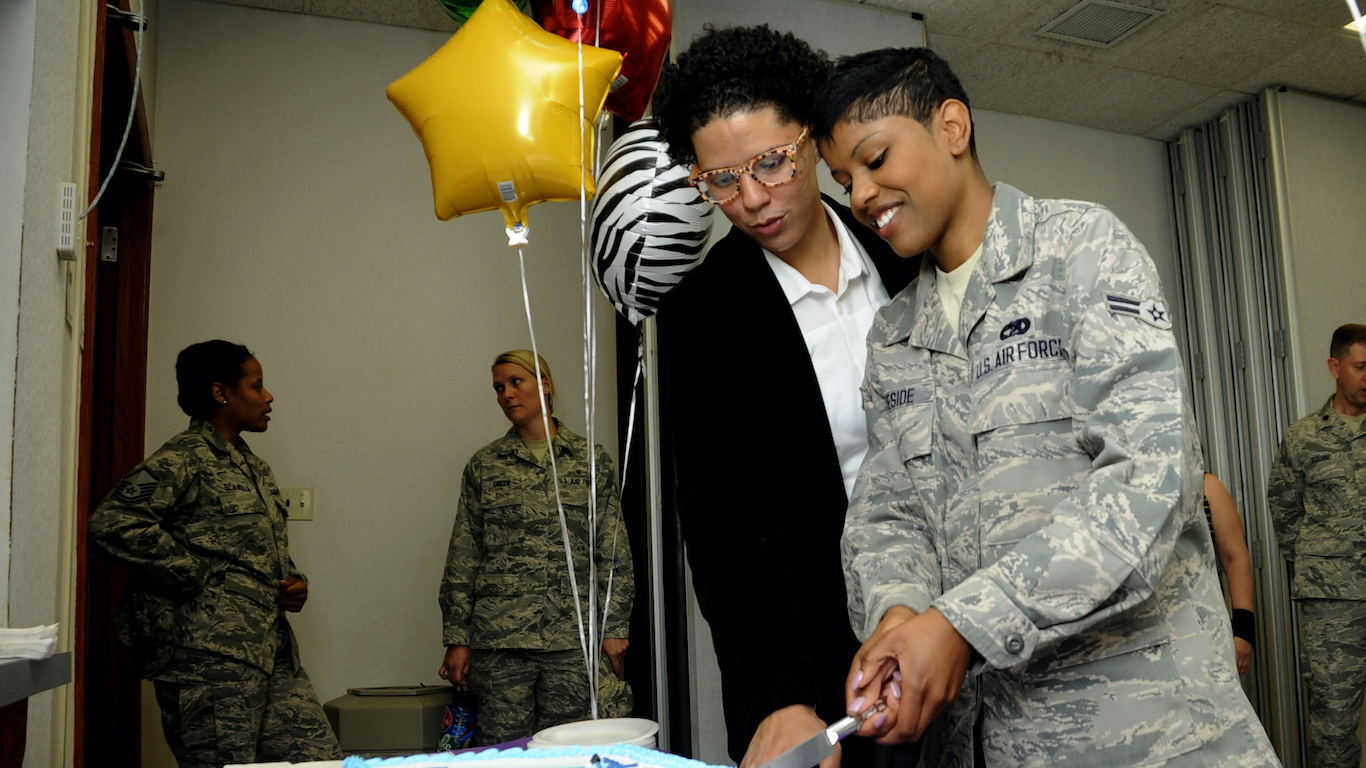
6. Delaware
> LGBTQ population: 4.5% — 12th highest (total LGBTQ people: 34,000)
> CenterLink pride centers: 3 per 100,000 LGBTQ people — 11th highest (total: 1)
Delaware advertises itself as a gay-friendly tourist destination, specifically citing its beaches and nightlife. In most cases, LGBTQ people in Delaware enjoy the same legal protections as non-LGBTQ residents. Nondiscrimination laws include housing, employment, and public accommodations. LGBTQ residents cannot be discriminated against if they want to have a baby via a surrogate, though there is no law banning discrimination against LGBTQ youth in foster care placement.
The state allows gender marker updates on both driver’s licenses and birth certificates and has banned conversion therapies.
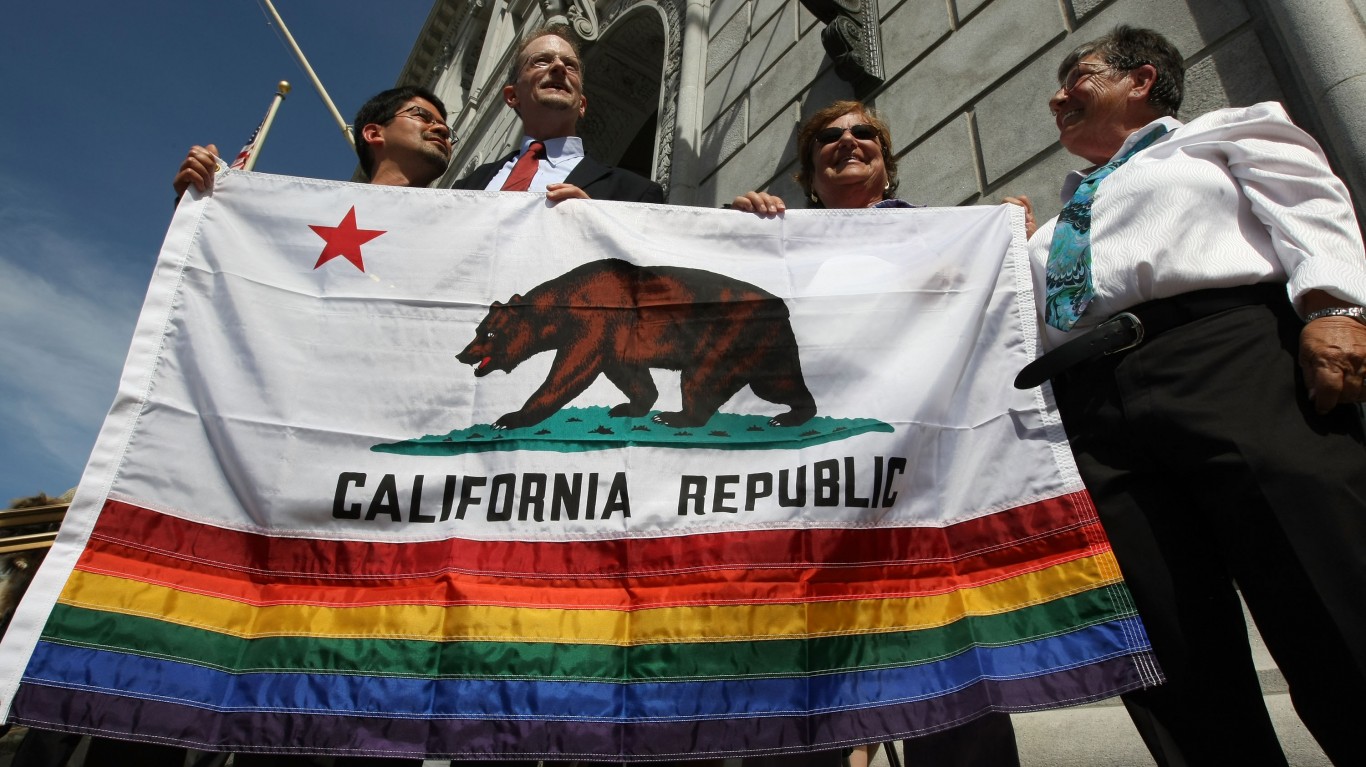
5. California
> LGBTQ population: 5.3% — 4th highest (total LGBTQ people: 1,615,000)
> CenterLink pride centers: 2 per 100,000 LGBTQ people — 23rd highest (total: 37)
Legally, there is no division between LGBTQ and non-LGBTQ residents in California. The state has only “good” laws benefitting the LGBTQ community and no “bad” laws at all that discriminate against LGBTQ people, according to the HRC. Nondiscrimination, parenting, hate crimes, youth, health and safety, and religious laws and policies all cover sexual orientation as well as gender identity.
California, which accounts for about 77% of LGBTQ adults living in the Pacific states, according to UCLA, is one of eight states that have enacted legislation banning the use of the LGBTQ “panic” defense.
[in-text-ad]

4. Oregon
> LGBTQ population: 5.6% — the highest (total LGBTQ people: 183,000)
> CenterLink pride centers: 2 per 100,000 LGBTQ people — 15th lowest (total: 3)
No state has a higher share of LGBTQ people in its population, at 5.6%. The state has nondiscrimination laws covering many important areas, including employment, housing, education, adoption, and more. It has made great strides in the past decade, passing 27 bills that brought Oregon’s LGBTQ population closer to equality.
However, Oregon had 31 hate crimes motivated by gender identity or sexual orientation reported in 2018, one of the highest hate crime rates among states.
3. New York
> LGBTQ population: 5.1% — 7th highest (total LGBTQ people: 800,000)
> CenterLink pride centers: 2 per 100,000 LGBTQ people — 24th highest (total: 18)
New York has special significance to the LGBTQ community, as the Stonewall riots of 1969 in New York City helped spark massive changes in the nation’s understanding of LGBTQ issues and paved the way for more equality to the LGBTQ community.
Today, New York ranks as one of the best states for LGBTQ people. In the last decade, the state legislature has passed 30 laws protecting the rights and safety of its LGBTQ residents. The state has some of the most comprehensive non discrimination laws of any state.
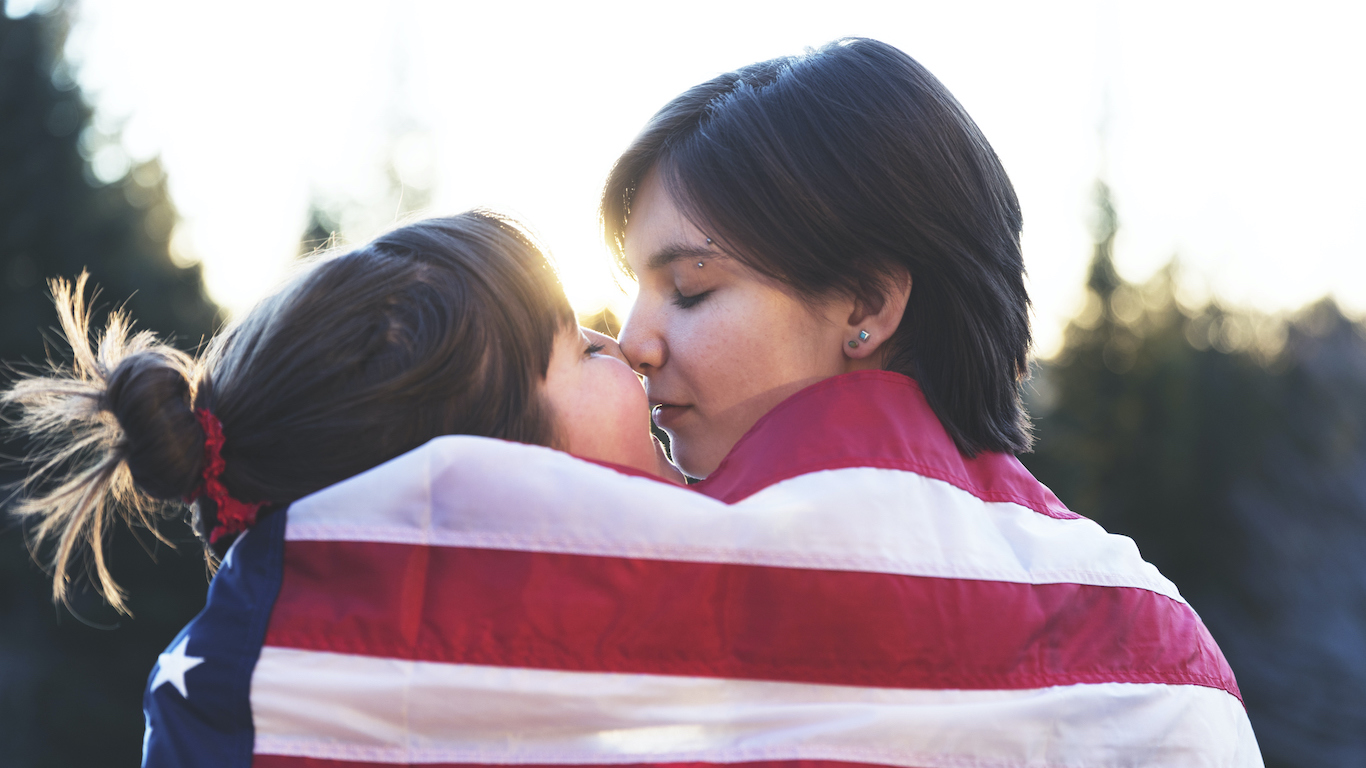
2. Vermont
> LGBTQ population: 5.2% — 5th highest (total LGBTQ people: 26,000)
> CenterLink pride centers: 12 per 100,000 LGBTQ people — the highest (total: 3)
Vermont ranks as one of the best states for LGBTQ people. It provides better access to CenterLink pride centers than any other state. Vermont has an estimated 26,000 LGBTQ people and three pride centers.
The state also has some of the most comprehensive health and safety laws for LGBTQ residents among all states. It ensures that transgender people cannot be excluded from health care. Vermont also collects data on the health and well being of LGBTQ youth and adults. It also has extensive nondiscrimination laws.
[in-text-ad-2]
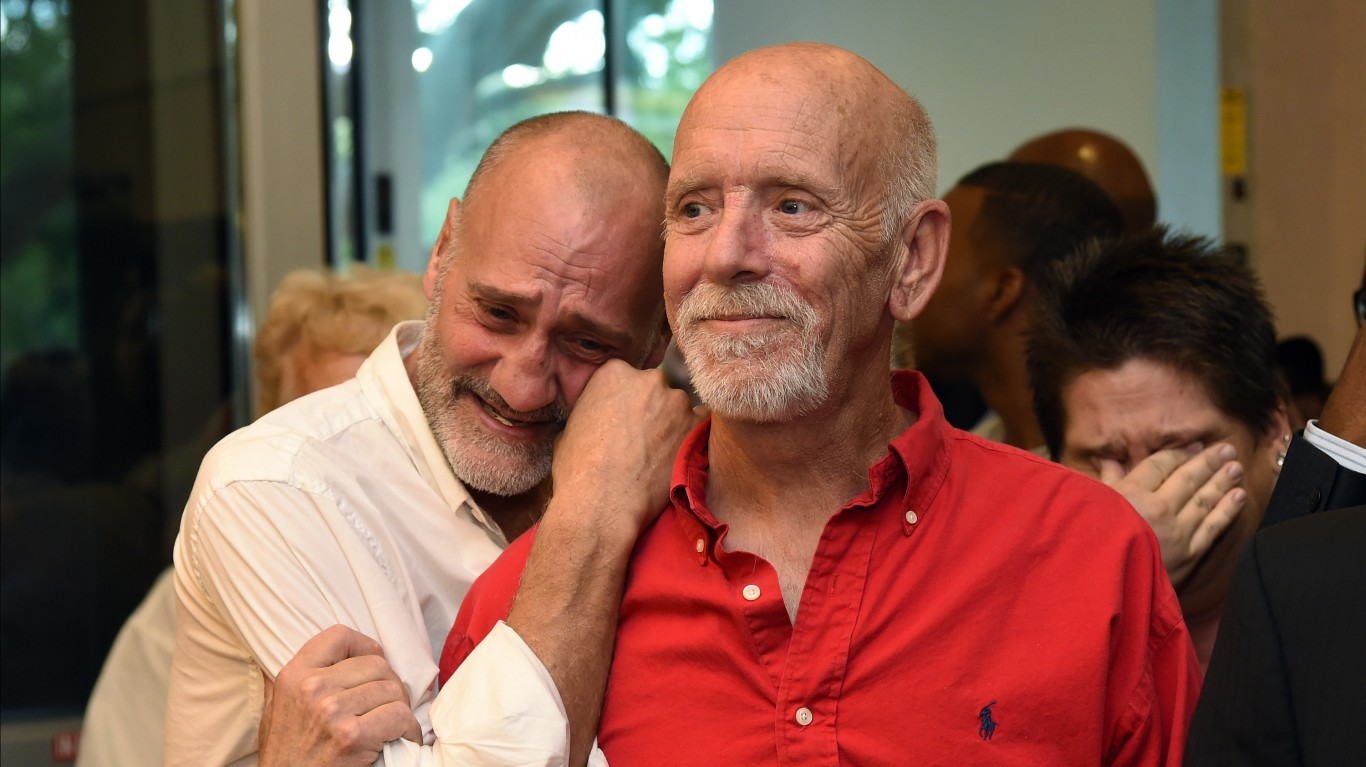
1. Nevada
> LGBTQ population: 5.5% — 2nd highest (total LGBTQ people: 127,000)
> CenterLink pride centers: 2 per 100,000 LGBTQ people — 21st highest (total: 3)
Nevada ranks as the best state in America for LGBTQ people. It has a relatively low share of hate crimes motivated by gender identity or sexual orientation. It also has nearly all laws suggested by the HRC for LGBTQ rights, including nondiscrimination laws, parenting laws, statutes against hate crimes, and those ensuring protections for health care access.
Nevada passed 34 laws protecting the rights and safety of its LGBTQ residents from 2009 to 2019. The state also has no laws considered infringing on these protections, according to the HRC.
Methodology
To identify the best and worst states for LGBTQ people, 24/7 Wall St. created an index of three measures: hate crimes reported per 100,000 people, laws protecting LGTBQ communities, and the percentage of each state’s population who identify as LGTBQ. Each of these three measures were weighted equally in the index.
1. Hate crimes motivated by sexual orientation, gender, and gender identity, reported to police departments for every 100,000 people came from the Hate Crime Statistics Program of the FBI’s Uniform Crime Reporting (UCR) Program for 2018 — the most recent year for which data is available. We combined these three hate crime types and adjusted to population figures used by the FBI in the crime report.
2. State laws affecting LGBTQ communities came from the Human Rights Campaign’s 2019 State Equality Index, which defined such laws as positive or negative to LGBTQ Americans. The Equality Index classified each state into one of four categories: “high priority for basic equality,” “building equality,” “solidifying equality,” “working toward innovative equality.” 24/7 Wall St. assigned scores to each of the categories that could be normalized for the index. States that were labeled a “high priority for basic equality” received the lowest score, while states that were “working toward innovative equality” were ranked higher on our list.
3. The size of each state’s LGBTQ population came from the UCLA School of Law Williams Institute, a research organization that collects data and research on gender identity and sexual identity policy.
The number of pride centers in each state came from CenterLink, a network of pride and community centers around the country. It is important to note that there are many pride centers across the United States that are not part of the CenterLink network. We adjusted the number of centers to the number of LGBTQ residents in each state.
The thought of burdening your family with a financial disaster is most Americans’ nightmare. However, recent studies show that over 100 million Americans still don’t have proper life insurance in the event they pass away.
Life insurance can bring peace of mind – ensuring your loved ones are safeguarded against unforeseen expenses and debts. With premiums often lower than expected and a variety of plans tailored to different life stages and health conditions, securing a policy is more accessible than ever.
A quick, no-obligation quote can provide valuable insight into what’s available and what might best suit your family’s needs. Life insurance is a simple step you can take today to help secure peace of mind for your loved ones tomorrow.
Click here to learn how to get a quote in just a few minutes.
Thank you for reading! Have some feedback for us?
Contact the 24/7 Wall St. editorial team.